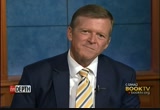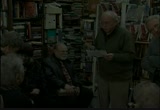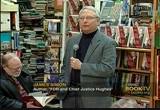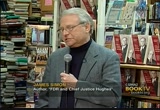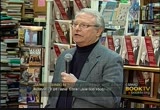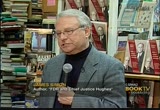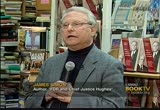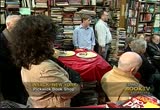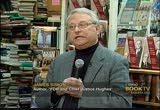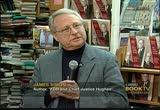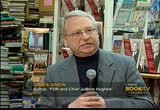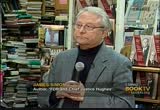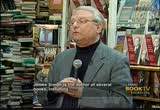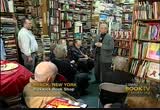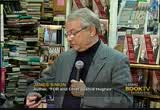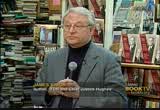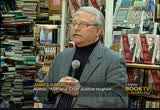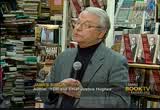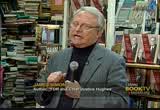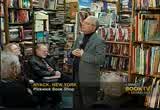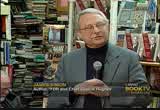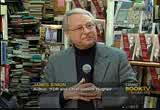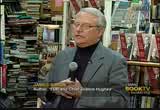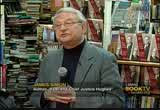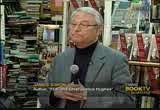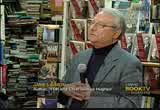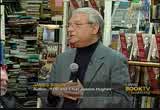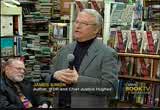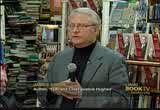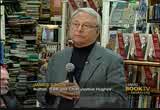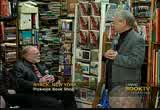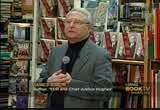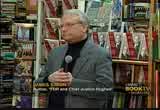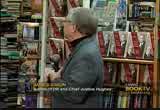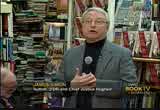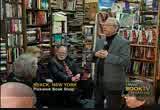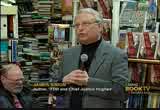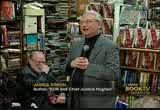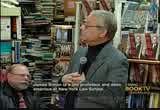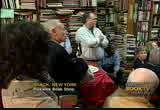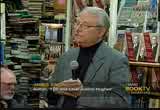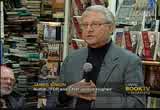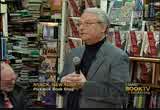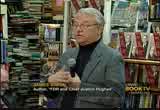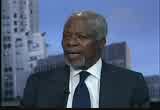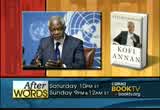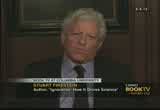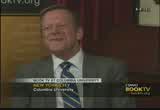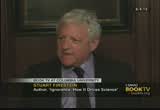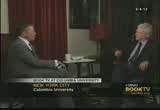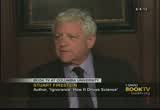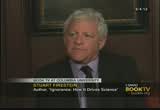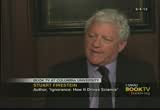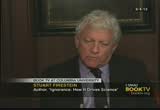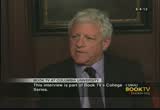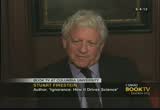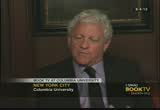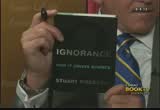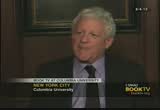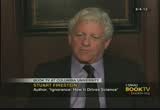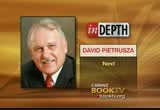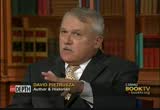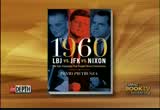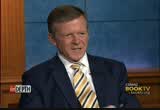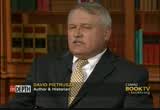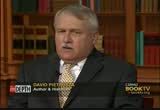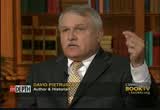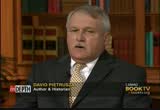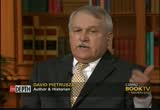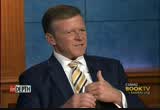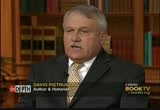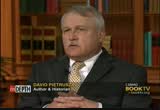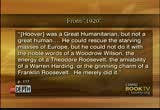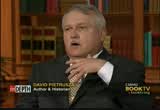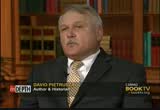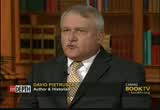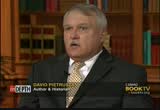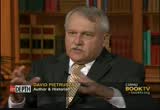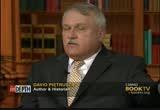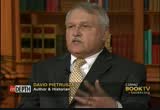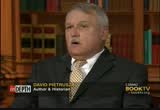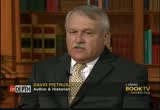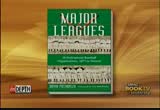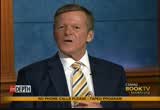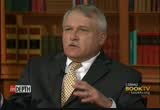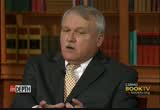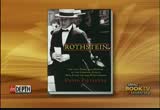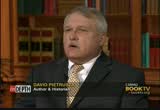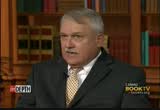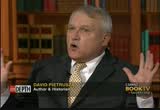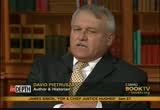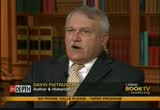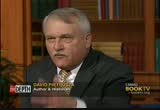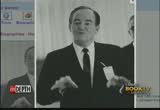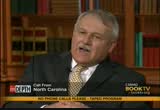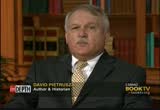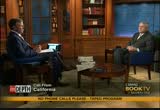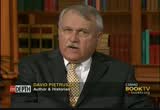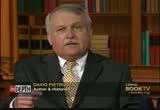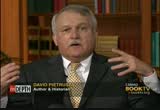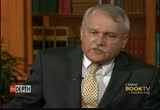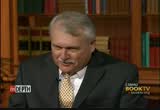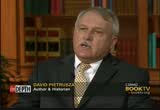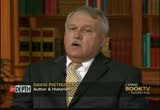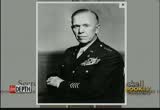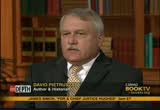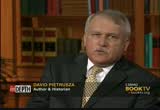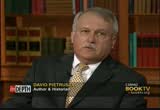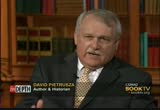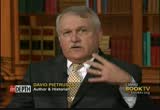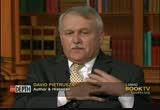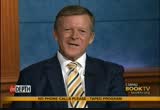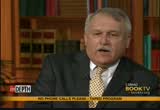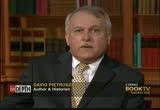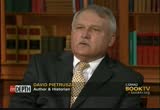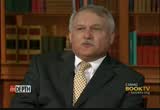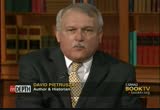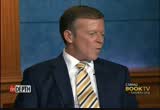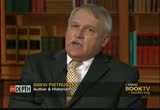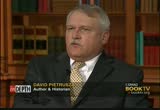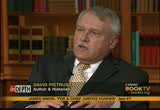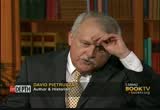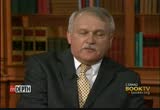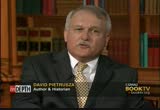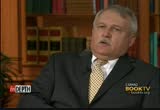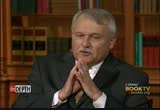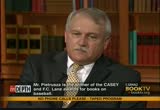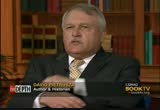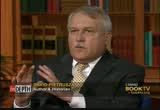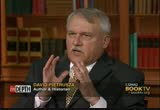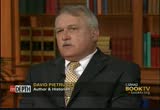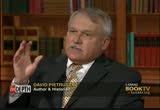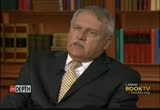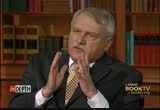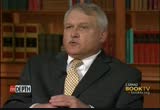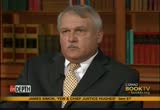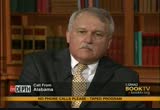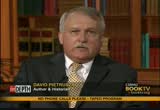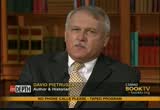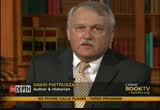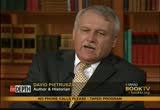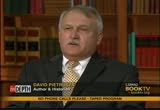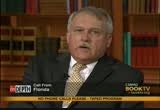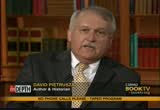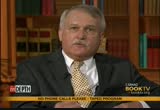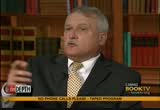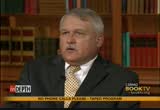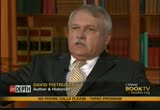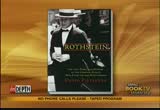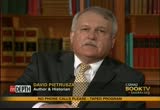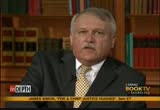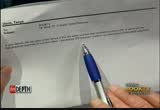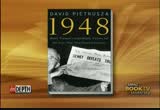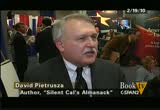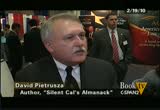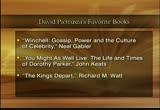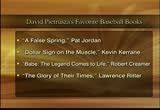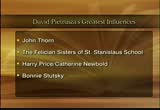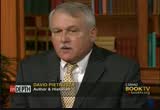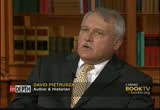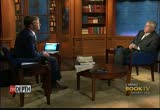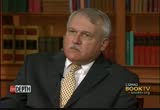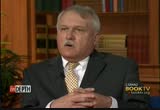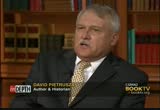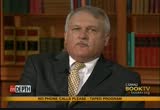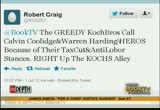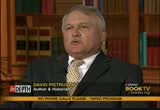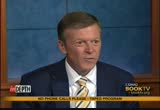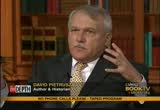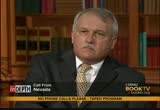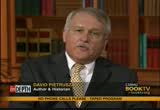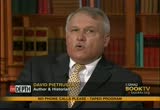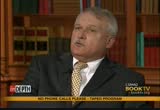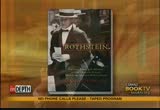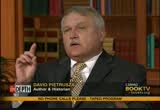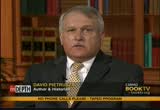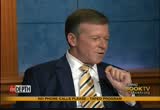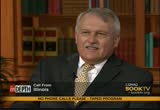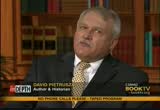tv Capital News Today CSPAN September 7, 2012 11:00pm-2:00am EDT
11:00 pm
11:01 pm
>> next on booktv, said to account for competitions of a federal buzz about and chief justice charles evan hughes. the author reports the proposals are consistently challenged by the chief justice is unconstitutional. but when president roosevelt's reelection in 1936, he introduced legislation to restructure the supreme court but the purpose of packing the court with pro-nuke deal justices. it's about 45 minutes. >> good afternoon, ladies and gentlemen. my name is john dunnigan, owner of piglet extort. thank you for being part of this event for james simon. james book so there are two great acclaim or what kind of nation the center holds him again and chief justice tawny
11:02 pm
were just terrific reads. his newest book is "fdr and chief justice hughes" and it's just been released by simon & schuster. i would like to introduce james asked simon. thank you. [applause] >> thank you, jack. it's always such a pleasure to be here. this is my favorite bookstore and it's just a wonderful old-fashioned bookstore for real readers. and i have always insisted i had my party here and i'm very delighted to have all of you here, friends and family and others interested in american history. i thought what i would do is speak about the book for maybe 15 or 20 minutes and open it up for questions. so the first thing is the
11:03 pm
liberal president and conservative court. have you ever heard of any of those? of course you have. but it's not the present liberal president and a conservative court. it is president franklin roosevelt in the hughes court of the 1930s. indeed erase 75 years ago this month that franklin roosevelt announced his court packing plan, the subject of my book in a moment. but the clash between roosevelt and hughes at a critical time in american history. it's a great story and important one. also it raises questions that were important 75 years ago and are important today. one being whether life tenured
11:04 pm
justices and conservative justice of the supreme court of the popular well. alternatively whether it popularly elect the president pitcher or two then the court to his political policies. those are questions and issues today. let me tell you a little bit about roosevelt and hughes who were remarkable leaders of the 20th century. they had a great deal in common. both were born in new york. both were only children, to doting parents. both are ivy league educated. both went to harvard and hughes went to brown. both were two-term reformed
11:05 pm
governors of new york. so that was what they have in common. now we had a good deal there that they did not have in common as well. roosevelt was raised in gilded splendor anina stated duchess county, new york in hyde park. his parents james and sir roosevelt took franklin to europe on a luxurious extended summer tour every summer. a prep school, before matriculating to harvard. roosevelt had a very, very calm to pull. on the hand was the son of a baptist minister who preached in
11:06 pm
upstate new york and also in new jersey. they were a family of very modest means. and hughes was essentially partly can be somewhat except did. his parents were quite well-educated and they were very, very bickers teachers and todd charlie s. lewis called from a boy. literature and history and not and he toed the line, literally. his mother made him toe the line on mathematics. and hughes himself read deeply and widely on his own. and indeed, he only had really one year of formal schooling before he graduated from ps 35 in new york city at the age of
11:07 pm
12. and he wanted to go to college, but he acquired in their life they couldn't go to nyu. he took a year off and in the meantime a friend told him about madison college, which is now called in an upstate new york, clinton new york. and at the age of 14, little charlie is getting taller now went to colgate and made superior grade, became restless and transferred to brown university, where he was elected phi beta kappa his junior year and graduated third in his class. so you can see that history schachter he was slightly different from roosevelt. hughes was a prodigy. he had a photographic memory.
11:08 pm
and i said, he was a superior student even before he went to school and continues throughout his career. on the other hand, franklin roosevelt to talk about the differences in contrast is quite an indifference at harvard, made, you know, okay grades, but not being special and has great interest was harvard crimson, the newspaper at harvard. so he didn't switch too much time studying. and he like hughes went and studied at columbia law school in new york city. he was at the top of his class, made the highest rate ever recorded on the new york bar and franklin actually flunked a couple courses. never finished, but did pass the new york bar. houston went on to be a
11:09 pm
brilliant lawyer in private practice, but also made his name as an investigator of corruption and mismanagement in the utilities and insurance field. and he was a very cool, very tough investigator. one very indignant ceo of an insurance company when the question got very, very tough set to hughes, sir, we are missionaries serving the public interest. and hughes said he was looking into what seem to be exorbitant salaries. he said yes, but the question still comes back to the salaries and the missionaries and he just kept pouring in and made such a great impression on everybody that catapulted into politics. he was elected governor of new york republican and reelected.
11:10 pm
franklin on the other hand never really cared. never really liked it. he was waiting for his main chance and to show his great talent, which was in politics. so you can see the contrast between the two of them as they went through their early careers. their careers began to intersect in 1916. and that is when franklin was now an assistant secretary of the navy. he very consciously patterned his career on his kaizen commit theodore roosevelt. roosevelt had been elected to the state legislature, the new york legislature, as was franklin. and tr had become assistant secretary of the navy has now had fdr.
11:11 pm
all that was left was for fdr to become vice president because that is what happened to tr, teddy roosevelt after serving in the cabinet as assistant secretary of the navy and went on to become vice president and president of the united states. in 1916, roosevelt the secretary of the navy. he has been appointed to the record as the associate justice by president william howard taft. but he resigned in 1916 to become the republican candidate for president and he ran against woodrow wilson and a dreadful campaign he was the odds favor, but ultimately lost california by 4000 votes and therefore the election. he went to bed the night of the election thinking he had one.
11:12 pm
franklin roosevelt was said that wilson supporter went to bed thinking he's had one also. and the next morning the returns from the midwest and particularly california came in and it turned out that wilson one the election just rarely. roosevelt continued as assistant secretary of the navy and then he has to act to private practice in new york city. roosevelt in 1920 became the vice residential candidate of the democratic party, running with governor james cox of ohio. they got trapped by calvin coolidge and warren harding, coolidge's republican party. and at the same time after harding was elected, he was appointed hughes secretary of state. one year later, their fortunes
11:13 pm
seem to have gne one going up in one going down. hughes became an extraordinarily successful secretary of the state. he convened a disarmament conference in washington in 1821 and he negotiated a reduction of the tonnage of warships of the three major naval powers be in the united states, great britain and japan at that time. it is a great triumph for him. roosevelt on the other hand, in 1921, was paralyzed from the waist down with polio. and what would seem to be a very promising career -- there was talk in 1920 that roosevelt would be the democratic nominee for president in 1824 or 1928, but he was paralyzed.
11:14 pm
he looked at his career was over. so you have hughes going out than roosevelt going down. but by 1924, roosevelt that indomitable spirit began to think of a political career yet again and he is asked to nominate smith at the democratic convention at madison square garden in 1924, which he did. he had braces all the way up and down his legs. he went to the podium on the arm of his 16-year-old son, james and of course try to make it look effortless. it wasn't as he made his way to the podium. but then he gave a great speech talking about the happy warrior and the crowd erupted. they were just deliriously happy and never quite be not just for al smith, but certainly for franklin roosevelt as well.
11:15 pm
in four years later, roosevelt was the lack of governor of new york and in 1830, he was reelected by a landslide. in 1930 president herbert hoover appointed hughes chief justice of the united states. so you can see they are beginning to come together and there was great talk of roosevelt as the democratic nominee for president in 1832. so in 1832 of course he campaigned against hoover and beaten very badly. and in 1833, march of 1933, franklin roosevelt and charles evans hughes exchanged letters. franklin roosevelt wanted to know if he could recite the entire article, not just saying i do and asking hughes if that
11:16 pm
was okay, he remarked that it was very interesting that one former new york governor was going to be administering to another new york governor and each expressed great respect for each other and looked forward to their associations in a common enterprise. and so, roosevelt as an underrated president in 1833. by this time, hughes had made a very strong record in civil rights and libertarian. he wrote some very important decisions, protect your freedom of the, for example, and freedom of association. but what got him in roosevelt on a collision course with the constitutional challenges to the new deal legislation, particularly in 1835 and 1836, the hughes court began to strike
11:17 pm
down one piece of new deal legislation after another. now, hughes was actually a centrist. he was a very conservative or liberal. he was a centrist capote wanted in the worst way to keep the court together and project an image of stability and integrity so he tried to mask the court when he could. and sometimes he could. for example, the court unanimously struck down to national recovery act administration, which was the new deal legislation trying to spur the industrial sector of the economy. but he was not so successful when the court struck down the agricultural adjustment act, which was the actually try to spur the agricultural economy. so sometimes hughes had most of
11:18 pm
the court with them and sometimes he didn't. he sort of went back and forth and try to weekend project the notion of stability on that part of the court. and his nuanced treatment of the constitutional cases that went right past franklin roosevelt. he was just furious. he was furious over every single decision in which the court made up of four ideological conservatives and basically three liberals. the liberal wing was led by justice louis brandeis, but also justice benjamin pedrosa and justice harlan stone. and hughes and his fellow hoover appointee, justice roberts were sort of in the metal. but roosevelt won the election in a landslide in 1936 and he'd
11:19 pm
been thinking about doing something about the conservative court for a long time. he thought about a constitutional amendment. he thought about various kinds of statues that might limit the court and even a court packing plan, a court packing plan in which he would appoint additional justices who would be more sympathetic to the new deal legislation. so in early 1937 on the heels of this very impressive reelection victory, roosevelt announced a court packing plant in 1837. in his plan does he was there and he said that the justices on the court were rather worn out and too old and they needed some new justices who had a little
11:20 pm
more energy, will of course he would appoint. and it turned out his proposal was that he would be able to appoint one justice for every justice over 70 years old. it turned out six of the justices who are over 70 years old, including chief justice hughes. but nobody was really fooled i roosevelt and his proposal. everybody saw it for what it buys. it was an attempt by him to undercut the conservative court and try to restore the new deal constitutionally. and hughes, who of course said nothing publicly was furious and he was asked by the senate judiciary committee if he would write a letter, which he said. it is a seven page letter in which he documented how that court was completely up to date.
11:21 pm
he also said that if there were additional justices, if the court came to 15 justices, it would slow down their work rather than speeded up because there'd be more conferences and more opinions and take more time. so he very emphatically reject the idea that this court packing plan was a good idea. and the plan was resoundingly defeated. later roosevelt did not duration for hughes said that he was the best politician in the country. he just had a deal with one of the most popular presidents in all of our history and very effectively do that. now what is interesting is her 1937 to 1940, both roosevelt and hughes continued to lead.
11:22 pm
they did not seek leadership had roosevelt had been defeated. his court packing plan had been defeated. hughes has virtually and indeed it appointees. roosevelt appointed five members to the court in less than three years from 1937 to 1940. so hughes was surrounded by new appointees all new dealers. and get hughes himself can do need to meet that court. felix frankfurter, who had been a confidant of justice stone during the worst part of the destruction of the new deal by the conservative court thought that he was just skating criticism of hughes. unless he got on the court committee considered she is one of the great chief justice says of all time, compared him to toscanini and his mastery of constitutional cases. so hughes continued to lead,
11:23 pm
even though he was outnumbered on the court by roosevelt appointees, had great admiration from all of his new colleagues. and he basically ushered in the new constitutional era in which the court began to expand civil rights and liberties, which was something he cared dearly about and they began to defer to congress and economic and social legislation. roosevelt never gave the beard he was still not over his defeat on the plant. he was as angry as he could be. he refused to talk to some of the senators who had been instrumental in defeating him, but then he got on with the business, particularly in 38 and 39 of try and to get a to the allies, particularly great britain. and it was very difficult
11:24 pm
because he sees an isolationist congress and some of those who opposed his giving aid to great britain were some of them who opposed his court packing plan, too. that he and people like wheeler of montana. the roosevelt was up to the challenge and he outmaneuvered them and he was able to get to church hill before the u.s. entered world war ii and i think is terribly important. so hughes then retires from the court in 1841. and of course we know that roosevelt continued and was elected to a fourth term in 1940 and really the church hill was instrumental i think it's the mass towards an allied victory. towards the end of his life he was really very, very thick, but nonetheless he refused to give
11:25 pm
in. he never let anyone know he was as sick as he was and then he died in 1945. vendors of photographs, the last photograph in my book on fdr and chief justice hughes' hughes and his wife, antoinette after the funeral service at the white house. and hughes looks absolutely distraught, which suggests to me that he really, despite their clashes come of their heat great respect and affection for franklin roosevelt. and i know it's very clear from the documentation for roosevelt did for hughes. so it seems to me that now we move forward just slightly to the 2012 and also just come a certain parallels between the two presidents and the courts
11:26 pm
and may be some differences. and i'll open it up for questions. first the parallels. roosevelt, like president obama was a reform democrat -- democratic president. and both of them were willing to challenge the court than they thought their decisions were wrong. certainly franklin roosevelt did at some length over a long period of time. obama showed at his state of the union and 20 times that he was willing to challenge the justices sitting and bright in front of him on the campaign finance a citizen united case. i have no doubt that if this court, the roberts court strikes down the health care law, which of course is coming up for argument next month, if they
11:27 pm
strike at down all or part of it, i think president obama will be critical. will he propose a court packing plan as fdr did? adult excel. obama was a very keen student of american history and he knows that most historians and the court clacking plan is one of the worst things that franklin roosevelt ever did during his tenure as president. what about comparing the hughes court and the roberts court and the two chief justices? well, they're sort of parallels. both hughes and roberts were brilliant lawyers before they were appointed to the court and they were both appointed by republicans presidents. but i would suggest to you that there's a difference in their politics and in their constitutional interpretations as well. hughes is a centrist as i said
11:28 pm
to you. he was a progressive republican. as governor of new york, he was an internationalist secretary of state and he really wanted to pull the court together and he was not ideological in his decisions. chief justice roberts on the other hand, it seems to me before he came on the court he was a fierce advocate for conservative causes. and on the court, he's consistently aligned himself with the most conservative members of the court on the most polarizing issues such as campaign finance and affirmative action, for example. so i think there are similarities and/or differences. i do believe the court will be an issue in the fall presidential campaign because a
11:29 pm
lot is at stake in terms of the future of the court. whoever is elected in november is probably going to have at least one and maybe more appointments to the court. four members of the court for over 70 years old. if during the next term there are at least two appointments, of course it depends on who they are. there's a good chance that the future direction of the court will be determined for many years to come and defend no small measure the future of the nation. so there are parallels. there's historical lessons to be learned from my book on fdr and chief justice hughes, but i just think on its own it's a fascinating story of two remarkable leaders of american government in the 20th
11:30 pm
11:31 pm
11:32 pm
hughes. he was not the humble intellectual. he was a really brilliant guy. but i don't think, so far as i know, -- there was no arrogance in terms of resentment in terms of class. president obama might learn from studying my book on fdr and chief justice hughes he would already know without reading the book but it was more towards his temperament. one of the more considered. fdr just got angry as heck all the time. i think obama is much more surreal and careful [inaudible]
11:33 pm
>> i think that he could go out and he could study some of what roosevelt did. whether these were authentic constitutional decisions whether rendered by ideological conservatives that were interested in conservative results. this was roosevelt's view, and i suspect it was president obama's view, too. speak in a microphone, please. >> [inaudible question] >> who bobby's cases against his deal? >> it will not surprise you ever
11:34 pm
cases against the present health care, as well. generally, people who are critics of the statute, who may be politically opposed to the administration in power. that certainly was so during the new deal. there were a number of cases brought by those, some of who have been very active in the republican party. particular statutes were struck down. one was a national recovery administration, which was a major statute with the national industrial recovery act. and that was a very blasé the
11:35 pm
agricultural act was the second one. there were a number of others as well. that went up and down the spectrum of new deal legislation. >> rick perry suggested possible term limits on the court and just generally, what do you think that that would provide as far as the balance i read that. i don't think it's going anywhere.
11:36 pm
i think even with the fdr court packing plan, again, as i told you earlier, he was reelected in a landslide in 1936. in terms of tenure or appointment. i think that would be even more so today. i think that american voters as a whole like their supreme court. they revere the supreme court and they don't agree with all the decisions, but they respect the institution as it is. >> what was the age difference? >> between roosevelt and hughes? quite a little bit. hughes was born in 1862 and roosevelt was born in 1880. it was almost an eight year age
11:37 pm
difference. he was, by the way, was a progressive republican his father was a fan of lincoln. he remembered that his father said to his mother, if you have been killed, i wouldn't have felt any worse than i do today. [laughter] they were a very happily married couple. >> my question is about the supreme court in general. on one side they seem to be like a stepchild if someone wants to get rid of it on the other side is a mighty powerful monarchy. what do you think?
11:38 pm
you think they should be reelected? you think they should have term limits? >> i practiced constitutional law for many years, this is my bread and my butter. it is important that there be a stability to the court. i don't think that they should be elected, i think they should have security even when there is great controversy as there was in the '30s and is as there is today and probably will can continue to be, the court goes about its business in a very professional way. in the church has a way of working itself out. for example, the court struck down many new deals and statutes, but within five years, roosevelt had appointed a number of justices and most of the
11:39 pm
later legislation, the economic legislation was upheld as constitutional. it goes in cycles. >> i've always been interested in the presidential executive decision in 1941 to remove thousands of japanese-americans from their homes for as many of whom were citizens and put in concentration camps. i don't know if charles hughes was still the chief justice at that time. but i'm wondering, if you had come across any of the reasoning behind a liberal the liberal presidents such as roosevelt allowing that to happen. >> roosevelt issued executive orders, which essentially, it allowed the displacement of these japanese-americans on the west coast. and it was a terrible decision on his part but it was
11:40 pm
sustained. it was sustained by the u.s. supreme court. hughes was no longer on the court. but roosevelt appointees were great libera read william douglas. felix frankfurter. why? because they were patriots. and they thought it was important, the military told him there was a danger on the west coast from sabotage, from japanese-americans, they were inclined to defer to the military on that. terrible decision. it was a terrible decision during world war ii.
11:41 pm
this was after hughes was no longer chief justice. but generally speaking, the court tends to downgrade civil rights and liberties in times of war. certainly, that was the case of world war ii, because, the national security is the number one issue, i think. >> [inaudible question] >> yes, but the great challenge and the growth displacement was of japanese-americans. and that was something the court rendered several decisions, one of them was the most important was the karl marx decision in
11:42 pm
which they basically gave the military the liberty to deprive japanese-americans of their liberties. >> returning to the similarities between the past and the present, are there some minorities in the constitutional arguments of hughes and striking down your legislation that will be referred to by the roberts court and the scope of executive power? >> just from one of the arguments, many of the decisions of the hughes court -- whether congress has exceeded its power to regulate interstate commerce. so whether it could be regulations that went across state lines, very broad
11:43 pm
regulations. well, that will be one of the arguments in the health care bill that comes up for argument next month. the question is whether congress has exceeded his authority under the commerce clause. most of the cuts towards congress, that is, i think most of the president, certainly in the late 1930s, some of which chief justice hughes wrote, he gave congress more leeway to regulate interstate commerce. that became pretty much the modern commerce clause doctrine for the next six years. but we don't know about the score. this is a very polarized court and presidents goes the other way. also. this will be very interesting to
11:44 pm
see that. to see what happens. thank you very much. [applause] [applause] >> your government and mine and it can be what these governments wanted to be. sometimes we talk about the u.n. as though it is a distance by doing that, we get the governments involved that are actually responsible in these situations. we are leaning them. when my predecessors used to say that we often refer to the secretary general as sg for
11:45 pm
short. it stands for not secretary general but scapegoat. [laughter] >> the scapegoat and she? >> exactly. a scapegoat function of the ui. the numbers in the media have to be very careful. we wanted them to be useful as an alibi. >> more with kofi annan interviewed on "after words", sunday at 9:00 p.m. and midnight eastern on booktv. >> visit booktv.org to watch any of the programs that you see here online. type the author or book title on the upper left side of the page and click on search. you can also share anything you see on booktv by clicking share on the upper left side of the page and selecting the format. booktv street is intense
11:46 pm
dreams live on every weekend with top-notch content nonfiction books and authors. >> stuart firestein, how many gringos we have? >> used to think a hundred billion. that number hung around for ages. it's in all the textbooks. a couple of years ago, a young anatomist in brazil e-mailed around and asking how many brain cells people thought that we had and where we got that number from. and everybody go back 100 billion and also a rollback -- i have no idea where that come number comes from, it's been all the books. it is actually not a trivial album. a new method was developed and she recounted them and found that there were only 80 billion. that is an order of magnitude.
11:47 pm
it's not that big of a difference. but the larger difference might've been that we thought we had 10 times as many glial cells, which are the packing cells of the brain. it means glue from the greek. and we thought we had 10 times as many, 1 trillion glial cells and it turns out that we only have 80 billion of those as well. in one fell swoop, you lost 120 billion cells in your brain. >> what don't we know? >> well, that's an awfully big question. as i point out now. ignorance is a much bigger question. i think the question is not only what don't we know, but what do we know that we don't know. >> he was absolutely correct in saying that although he sounded
11:48 pm
a bit befuddled because he was all worried about a war that wasn't going so well, but that is really a good question. are there limits to her ignorance. that is a more important question than a limit to our knowledge. >> you say in your book that you look at other scientists and you talk about things you don't know rather than what you do know? >> yes, my favorite quote is from marie curie when she gained her second graduate degree. she wrote a letter to her brother and said something to the effect of ones one never seems to notice what has been done, one only cares about what remains to be done. that is the attitude that drives the scientist along and get this into the lab room and keeps us there it there late at night and moves us along. we don't really care so much about what everybody knows. let's get on to the next thing. what don't you know. what do we need to know. what would be the next best thing to know. and so forth. >> page 28 of ignorance, george bernard shaw in a toast at a dinner setting.
11:49 pm
albert einstein proclaimed that science is always wrong. it never solves a problem without creating 101. >> and i say, is not glorious. which, i think it is. i think that is exactly the right description. absolutely. by the way, i should say that -- years before that, there had been a question propagation question. >> do scientists rest on their laurels after while? >> welcome i guess everybody does after some point. i think resting on the lyrical content laurels. one of the things that probably the public recognizes the least about science is that we tend to have less regard for facts then
11:50 pm
thought to be the case. scientists, although we work with that, we worked to get data, we also realize that they are the most malleable or least reliable part of the operation. whatever you find today will surely be superseded in some way or another, revised, overturned completely in the worst case, certainly revised by the next generation of scientists with the next generation of tools. it always has been in the past 400 years and for 14 generations, it's what we've done. i think that we welcome it. science is revision and we welcome addition. religion and science is a victory. >> you write that science and nature magazine is very important for scientists to get published in. but if you are going to recommend to your students to read those committee would recommend not reading recent reads but this issue tenders for. >> quite often what will happen is that someone will come rushing into the lab looks this week's program.
11:51 pm
let's get to work on this. of course, i know that the people who wrote a paper party done the next spearmint. and it's a real place to go often, for good ignorance -- what i call ignorance are papers that were published 10 or 15 years ago. in nature, high-quality leaders of the day but couldn't of asked certain questions because we didn't have the technology or the tools to develop in last 10 or 15 years. >> has technology helped in discovering science? >> yes, it is part of the whole arrangement. instrumentation has always been a critical part of science since galileo and the telescope began it all some 100 some odd years
11:52 pm
ago. >> besides the number of brain cells, what is another fact that we knew that has changed things? >> my laboratory happens to reach research taste and smell. we work on that. one of the best known facts is the so-called taste map would which you will find in every medical book. most people believe there is a map of sensitivity on your tongue and they taste sweepings with the tip of your tongue, sweet and sour things on the side and bitter in the back. this is completely untrue. it is a mistranslation of an anecdotal report by a the german physiology professor in the early 1900s, which was picked up by a well-known psychology professor in the 1940s, of all things, his book is called
11:53 pm
psychology. you can imagine is a joke for many generations of undergraduates. but he put this in his book as if it were a complete back and they will study back. it has stood the test of time somehow or another, even though totally wrong. >> what helps the test of time? >> from three or four or 500 years ago? >> so many things here. but maybe not in their original form. certainly newton has stood the test of time. newton continues to work. we can launch the space shuttle's and build bridges and all the rest of this sort of thing. using laws of gravity and force and so on. it has been revised significantly most notably by einstein. so they have been changed. but i guess the way they say it is that the regime in which newton's proposals were made and were true, they are still true
11:54 pm
than that regime. what has changed is we have expanded it. newton's formulations work as long as you're not traveling towards the speed of light unsent light. you have to invoke einstein's relativity. and we do that. for example, gps devices, which sends signals to satellite and back speed of light. they need to be adjusted by einstein's relativity in order to work properly, otherwise they do it all the time. >> has other einstein took? >> yes certainly stood out. he had a couple of budgets here and there. one of the biggest mistakes he made has cost a little bit, but now he has come back. of course come he doesn't know that, but it is something that came back. so far he has withstood the test of time.
11:55 pm
>> what is your class called? >> my classes called ignorance as well. it's a great pleasure to be able to teach at a place like columbia university. the class started about five or six years ago in 2006 and it was based on my feeling that i was doing student a disservice. i was giving him 25 lectures a year in neuroscience. using this textbook and pointing out that this textbook weighed 7.5 pounds, which is twice the weight of the normal human brain. so that can't be right. i think the students have gotten the idea by the end of the course that everything was known about neuroscience. that is certainly not true. the way that we kept track of what we know about her and are assigned as we build up a lot of
11:56 pm
facts and we stick to the encyclopedic books and that is not true. we don't know much about the brain yet at all. we don't even know what we don't know about the brain in some ways. we are still tinkering with marvelous things that we never would've thought of. i devoted a couple of lectures to that at the end of the course and thought, well, why not try the cool thing? why not seek it works for other scientists as well. that is what we do. >> the course meets once a week. i invite members of the faculty or other scientists who are visiting to new york to come in and talk to the students for two hours about what they know. very specifically. not big questions, they do a marvelous job on that. these are what i call case histories in ignorance. how an individual scientist grapples with what he or she
11:57 pm
doesn't know. why choose this rather than that. if you notice rather than that. if you don't know this rather than that. things of that nature. >> was the scientists that use in the course? >> in the book i include for case histories of scientists. a couple of them are confabulations of two or three. one of them is a scientist named diana reese who studies communication and cognitive processes in animals. and that's at the chapter up by saying is there anything harder than knowing that this is harder for you than me. and yes, i say, she has done some marvelous works with dolphins and things like that. i should be honest about it and tell you that she is my wife, as well. but she wasn't just a visitor at the class. i thought her work was so marvelous. three physicists who work in experimental theoretical physics. a couple of neuroscientists who
11:58 pm
work in various areas of neuroscience with new questions abounding that we haven't thought about until a few years ago. and i use myself as a case history. that happened because one class we had a speaker that got totally over the last minute and couldn't make it. i didn't know what to do and my wife said, why don't you fill in and be the speaker and i will interview you. i run a class and you be the speaker. so i did. i had the transcript and i was honest about this and i did this. >> how important is money to this research? >> well, well is important is money test almost everything. it's extremely important and something we have to think about as a culture. i think that the cornucopia we have gotten out of research, 14 generations is a testament to
11:59 pm
the reason why we should continue to support it, even when we don't know what we're going to get out of it. benjamin friedman was one of my founding fathers. another spectator said to franklin, this is fun, but what use could this possibly be? franklins retort was, well, what use is a newborn baby? that is a little tough. but that is franklin. but he's right, of course. what use is a newborn baby? we don't know. but many turn out to be quite usable, so invest in them. ..
12:00 am
has written 12 nonfiction books, including best-seller come in 1820 committee or the six presidents. also in 1960, silent cal's almanac and is 2011 release, in 1848. >> host: david pietrusza, what was it about the 1920, 19161848 election that made you write books about them? >> guest: at all stars one at0 a time.
12:01 am
i have been playing elaround win factoids and about presidential elections. and i've looked at that one and i started calculatingabout presd presidential elections. and i looked at that one come and i started calculating amount. 1961 or 1964 -- you had one president, lyndon johnson, you get kennedy, nixon in 1960, in 1968 we did nixon. you would get reagan. you might get three, usually get to. in 1920, you have six. >> six u.s. presidents? >> six in contention in one way or another. as several people have sent. yes, i know that. but if he is not dead, he is the nominee and the president of the united states. he sends his secretary of state to the convention to stampede
12:02 am
the convention. about idea. >> he wanted the nomination. and of course, harding, coolidge, hoover, wins two democratic primaries come fdr is on the ticket a device -- as a vice presidential candidate. you have this and so much else going on with the league of nations and every other thing. 1960, well, we move on from that to where you have three titanic personalities. we don't have six, but we have three of the biggest namebrand and presidential personalities ever. kennedy, nixon, johnson, so very different. so different in terms of dynastic or just personal, and something which, i think resonates so much with the folks and reading books today. 1948, that is a great cliffhanger. we love to listen to the experts. we'd love to get the weather reports. and they are always wrong and
12:03 am
the polls are always wrong, and the experts are always wrong, and by god, we love it when they are smarter than they are. it turns out that we can look back in hindsight and see how long they were in 1948. they saw that election night. the supreme court, we see that people are reminded of that truman thing with the supreme court health care nomination. we are not only the chicago tribune, fox news, but "the new york times", cnn -- they got the headline wrong really quick. >> david pietrusza, going back to 1920, herbert hoover 12 democratic primaries? two yes, new hampshire and michigan. he had some trouble deciding what he wants. he had been raised as a republican. there were not a lot of democrats in his hometown of west branch, iowa. the only one he could remember was the town drunk, which was very illustrative to him as to
12:04 am
what the parties were about. he had been a progressive to tr he had been a member of the wilson administration has domestic food administrator. he had gone with wilson to her side, think john maynard keynes said he was the only guy who came out with the reputation of his enhanced. and he is a great admirer of wilson. he could've easily flop to the democratic party that year, but he says, look, you have the democratic party, they are composed of three wings. southern reactionaries, big-city croaks, and agrarian nuts. and he says i don't want any part of them and i think also he didn't want to be part of a bloodbath where he would be carrying the flag for a party which was going down in flames i hear. >> in your book, "1920: the year
12:05 am
of the six presidents", published in 2007. you write republicans base an unprecedented problem in 1920. a logical candidate was dead. the democrats difficulty was even worse. a living president who would knock it out of the way. >> that is woodrow wilson. he decides that you see the silent films of him. he looks almost like the character that they used to do of the bluenose that was in favor of prohibition. the mechanical guy. he looks like he's going to be a very reedy voice, listening to the recordings and you have a great baritone voice. that is what made him have a great reputation as a speaker. he comes back as invalid, but he never tells anyone he's not
12:06 am
running again. the premier candidate, the real front-runner is the former secretary of the treasury, william gibbs back at you, who had helped put together the federal reserve, the stock market crash at the beginning of world war i the war economy with the war. and the problem is, he is the boss' son-in-law. he is woodrow wilson's son-in-law. he didn't marry the boss' daughter, but he got the secretary of treasury -- he is the secretary of treasury. he is a big deal before that, but now he's family. and he can't make the move from us wilson gets out of the way, and wilson never gets out of the way. which blocks it for him and you have this deadlock at the convention between him and another cabinet member, mitchell palmer. >> he is the democratic patron?
12:07 am
>> yes, on the democratic side, nobody particularly wants them, and it goes to james and cox of ohio who is sort of a dark horse he kind of sneaks and when there's a deadlock. he really does not do well, cannot swim against the tide that year. >> what was woodrow wilson's reputation at the end of the second term? >> pretty awful on all ends of the political spectrum. certainly the democrats had not been in favor of him, but the progressives, people progressives, liberals, they had been turned against them, i think because of the repressiveness of the war. you take a look at the statement by eugene debs, the socialist party candidate for president that year. in several years before that, who is in the atlanta
12:08 am
penitentiary for violation of the sedition and espionage acts. and he will say that woodrow wilson is alienated from the hearts of the american people at that point. it is a very tragic figure. more than that, more than recoiling from the war, and this is a common theme in 1920 and in 1948. those books. anytime you have an administration which gets us into a war, fight a war, it may be successful, but the american people -- any people and the people will turn against it. 1920 with wilson. the republicans went into congress in 1946. lyndon johnson not being able to see himself in 68 with the bushes. this happens over and over again. 1945, it was a heckuva good war leader -- winston churchill. there was a problem with that, but more than that, add one more gigantic thing to it. it is the economy.
12:09 am
the economy is a mess. you have the seattle general strike, you think of the world was about ready to blow up after the war. and the unemployment rate, the inflation rate, they are terrific. we would easily be satisfied with what is going on now rather than have that. >> in 1919 and 1920, was in a given or was it a general thought that whoever won the republican primary would win the presidency? >> yes, i think so. you would have to be dreaming to think of the as the year went on the democrats could pull it off. there is this massive, massive landslide. if it is not theodore roosevelt, the republican party splits wide open in 1912.
12:10 am
that is how woodrow wilson gets in. woodrow wilson has 41 or 43% of the popular vote that year. i think he gets less of a percentage of the popular vote in 1912 then williams jennings bryan does in getting killed in 19 way. or something at that. it is really a low turnout. the party healed itself in 1960, comes down close to winning. it is all very good thing, but the party comes together enough that charles evans hughes goes to bed thinking that he is the president-elect. and he is not. woodrow wilson, before that was putting together a scenario where an kc lost him he was going to resign and he was going to point to the secretary of state come in and the vice
12:11 am
presidency, the vice president would quit and they could take over. republicans win the congressional races in 1918. you don't need to be a weatherman to know which way the wind is warm. back to the first part of that statement, republicans face unprecedented problems in 1920, the logical candidate was dead, would tr have been the nominee if he had lived? >> absolutely. he was not only physically ill, and it is interesting that i think he makes a statement early on in his life that he's going to live that she's going to live life to the fullest until he is 62. and he dies about, you know, right on schedule. he had also been hurt very much by the death of his son quentin in world war i. he was an aviator on the western front. there is a book about tr and
12:12 am
large and the men loved war. he was willing to die himself and it may have been the last straw, which literally killed him at the end. his health really was bad. if he isn't, he wins. >> you write about herbert hoover in your book 1920. hoover was a premium, but he could not rescue them with the noble words of woodrow wilson, the energy of roosevelt, the amiability of a one harding or the grinning charm of a franklin roosevelt. >> yes. herbert hoover, until he becomes president of the united states, really has this remarkable career of achievement and despite his personal lack of charisma, it is the major story.
12:13 am
he is the orphan boy in iowa the goes out to oregon to be with his uncle and his parents, he has a dime in his pocket. he starts out with a dime. he goes to stanford, he continues on to gold mines of nevada or california. australia, rising up and up getting richer and richer indochina where he constructs being an engineer, a great engineer and construct the battlements, which saves the europeans and americans from the boxer rebellion. saving the americans stranded in europe when war breaks out. no one knows how to do it. he put together a private effort, got people out. he might've even got my great-grandmother out because that was one of the worst decisions of the family to go to europe. in 1914. he got those folks out. and he saved people after the
12:14 am
war who are starving, saved people in germany, saved people in russia come in the middle east, probably saved 2 million people from starvation. and he was a very energetic secretary of commerce under harding. and also coolidge after this election. but in terms of personality, dollar, pragmatic, one of the reasons why i think franklin roosevelt comes across like gangbusters in the depression with his fireside chats, is the fact he is following. after herbert hoover, you know, anybody could've sounded good. >> moving on to your book transport. published last year. your book "1948: harry truman's improbable victory and the year that transformed america." you write that victory has a thousand dollars. harry truman, and election day
12:15 am
that year, he seemed outright repulsive. not the effects of 16 years of their rule for their debacle. they wanted him out and they wanted him out now. >> yes, they did. we saw in the last presidential round of primaries that the republicans were everyone was saying you are the next reagan -- this guy is a reagan. there is not another reagan. and there wasn't another franklin roosevelt. harry truman sure as heck, to use that language, was not franklin roosevelt. franklin roosevelt could make those words saying and harry truman -- he did not have that gravitas, the persona. as explained earlier. you were coming off a war.
12:16 am
you are were coming off a war and people recoil from that with party in power. and he is the man who gets the blame pinned on him. you get that similar outbreak of strikes in 1945, 1946. amazing. you get that similar outburst of inflation and there was the fear of things worse. they expected a full-blown depression after world war ii, as had occurred in world war i. everyone expected it. that fear -- the fear gets played into the political picture as well. the democrats go down in flames. what is interesting -- >> in the congressional elections? >> yes, people talk about how the republicans in congress were so much more conservative than dewey going into that 48 election. they are actually more conservative than the democrats. all that is left, almost all
12:17 am
that survives was the southerners. >> how did harry truman when the democratic primaries where the democratic convention in 1947 and 1948? >> well, there are many primaries. there is an old saying that you can't beat somebody with nobody. okay? i think one of the things, having a president for 12 years, franklin roosevelt is -- it kind of the stories your bench. he was the big man. there wasn't this array of towering figures in the democratic party who could replace him. that is one of the reasons why harry truman,, who had been from one part of his career, until he does this magnificent investigation of the war industries during world war ii -- is basically a nonentity. he is not anything, not in any great shape. at that point he is elevated and
12:18 am
also, as the experts say, he is the one who does the ticket the least amount of harm in 1944. he goes on because the guy who is the vice president, henry wallace is the guy who can do the tickets the most amount of harm. the guys behind in the backroom go to franklin roosevelt and say he can cost you a million votes. if he says i got up i happened by half again, and if you are in the right state, i have a problem. >> did henry wallace run for president in 1940? >> he certainly did. it is almost like there is this grudge match, this personal grudge match, and ideological grudge match between the wallace
12:19 am
wing and the mainstream wing of the democratic party. wallace had to jump for the vice presidency. when truman takes it over, -- roosevelt had put them in the cabinet. it puts him at odds with the truman foreign policy. and truman fired him. any human being, any human being would be upset. wallace is upset, he falls into the hands of the communist party of the united states, which runs against truman, basically not to win the election, but to punish him. >> what role did dwight eisenhower played in the 1948 election? >> dwight eisenhower is, you know, you see the movie white
12:20 am
christmas with danny kaye and bing crosby, everyone loves the general. everyone loved dwight eisenhower. they didn't know he was a republican or democrat, liberal, conservative. but they knew he was a general and he knew he could win. the republicans wanted to draft him first, now is and that was a grassroots movement. and he turned that down early in the year and the republicans go off on their own. the leadership -- they want to put their own people and whether it is dewey or taft. the democrats, however, the leadership just before it the democratic convention, the week before the convention, there is a cabal of those crazy quilt of democrats. southern segregation-- big-city bosses like boss haze of jersey
12:21 am
or jake harvey of chicago, liberals like hubert humphrey, members of the roosevelt family. they all said that we won't bite. i cause back again. there is another explanation of why truman pulled this off, even though everyone is so wary of him. i can't repeat his words, but when he hears the words of the truman or eisenhower collapsing before the convention, he says, well, you tell those people that any link who sits behind his desk can get renominated. that is a large part of it. it is very hard to dump a sitting president in the nominating process. >> welcome to book tv's monthly "in depth" program. this is where we have an author on and we talk about his or her
12:22 am
body work. this month, it is historian david pietrusza. mr. david pietrusza began writing about baseball. in fact from his first book was minor merkle's come a legend and lou are of minor league baseball. that came out in 1995. lights on, the wild century long saga of baseball in 1997. his third book was judge and jury, the life and times of judge kennesaw and the life, times and murder of the criminal genius who fixed the 1919 world series. that came out in 2003. the history of america's inception in baseball, and presidential history from there, "1920: the year of the six presidents", that came out in 2007. "1960: lbj vs. jfk vs. nixon:
12:23 am
the epic campaign that forged three presidencies", and that came out in 2008. finally, his most recent book, "1948: harry truman's improbable victory and the year that transformed america." he is our guest for the next 2.5 hours and we are going to put the phone lines on the screen. if you'd like to dial in and talk some presidential or baseball history with david pietrusza. you can also send an e-mail to c-span.org or our twitter handle is @booktv. david pietrusza, how did you get from writing about baseball to presidents? >> i have been trained to be a historian. actually, that was my goal when i was a little kid.
12:24 am
would you want to be when you grow up? a historian. after a while, we got news for that answer and we got 2 degrees in history. basically, american history for the university of albany, which they call it now, upstate new york. then i went off to -- because history is a very hard thing to make a living and must you are teaching. i went off to make a living, actually signing off his face. yes. i kept dabbling in writing during radio and this or that. then became more and more active. i was elected in city council in new york. after about a year i said well, that is enough. i got off that, i really don't want to know the term. no second term. i'm going to have a lot of time left in my life. would i want to do?
12:25 am
i wanted to baseball. so baseball was a detour. but it got me writing again, it taught me some very valuable lessons. how to write. it was sort of like my undergraduate degree again to try and go back into writing. standard history, if you you'd call it. nonbaseball, nonsports history. and there were two transition books. the kennesaw mountain book, which was judge landis and 25 years of baseball. this book which i had done had concentrated a lot. we got into a progressive era, we got into the sedition trials of world war i. we got into the antitrust cases. rossing was a similar book. people say oh, you wanted to
12:26 am
write about the 1919 world series. no. no. what i wanted to do at that point was to write a book about new york city in the 1920s. but i didn't know to take organized crime or culture or immigration. did i take politics? and i found out that rothstein was involved in everything. from there, we ran onto 1920. in a way, a lot of it is another baseball analogy like ray hobbs. i was away from the game. away from game from long time, but then i came back into the game of history. >> we should also mention that david pietrusza is the co-author of a book on ted williams. and recently edited "silent
12:27 am
cal's almanack". the homespun wisdom of calvin coolidge. who is arnold rothstein? >> he was the father of modern organized crime. he is again land figure, he is a monster figure. but he is not one of those these them and those guys. he doesn't have a scar across his cheek. he doesn't have brass knuckles or commanding as part of his main business an army of thugs. although he will employ the muscle guys to collect debts and such. but he is, as one of his earlier biographies called him, the big bankroll. and he is a gambler when gambling is still very big and very fashionable and semi- legal in new york. and he moves into so many things from there is this big bankroll,
12:28 am
where he is putting together the money for rum running and bootlegging, and financing both sides of organized labor disputes, even financing it at one point, the folks from the communist party. i guess the shipment of cash had not come in from moscow that month. he is lending money to them. lending money to build broadway theaters and put broadway shows on. and financing the modern drug trade. so that he is involved in all of these things, not to mention fixing the 1919 world series, fixing a few very high stakes horse races where he could win $300,000 or lose $300,000 on horse racer karting. and he is involved -- this is also very political, because you see how all of these things are tied into the teens and 20s.
12:29 am
>> did he ever go to jail? >> no. he fixes the world series, even when he shoots three cops. the reason he shoots three cops is because the big bankroll had the rob at one time, and sometimes after that. they are having the oldest established permanent floating poker game in a hotel. some guys come bounding in he had a gun, he shoots three times, and he shoots weddings, maracas but doesn't hurt them, but literally shoots three cops through the door. you'd think one would go to jail for this. cops don't like that. even if you mistakenly shoot them. in the course of the illegal activity. but he has enough clout to get away with that. not be indicted, not how his fiscal permit yet, and they make a big stink of it, he is thrown
12:30 am
off a force for years. >> was he a known figure in american culture at that point in his life? >> well, we see in the great gatsby a character named maye will shine through his story. he supposedly models nathan detroit on it. this is a movie based on his death, downin .. 1934. which is starring spencer tracy, it would seem it would go against taxing. murray golden was enough. he is well-known to many interesting thing about when he dies his you'd think the headlines would say, arnold rothstein, shot. and the dislike, none of that. that is what way, way, way down
12:31 am
if at all in the story, because he is so much involved with everything else. kaj: >> before we go to the call, david pietrusza, how contested was the 1960 democratic primary? >> that is interesting because it is still so very different from the process today. when you say primary, it is interesting, because we should bey. when you say primary, it is interesting, because we should be talking primaries. but in 1960, we are talking primaries roughly plural, they're two of them. two of consequence, zero consequence for the republicans. but the democratic primaries involve, or the wisconsin primaries, hubert humphrey versus john f. kennedy in the west virginia primary, same two contenders, and it is almost like a stalking horse. he's kind of a stalking horse for lyndon johnson. >> what does that mean?
12:32 am
>> and fellow who is kind of, you know, saying he is operating on his own, but really at the behest of someone else. hopefully he had wanted on his own to be president. obviously, but lyndon johnson wanted it even more. because lyndon johnson once power more than anyone ever. the lyndon johnson always wants to do it in an indirect way that is back in the cloak room sort of way, and he's going to get the nomination, that's how he go and get it. it is not enter any primaries. he enters the democrat race like a week before the convention convenes in los angeles. you know, he almost pulls back. he almost pulls it off. jack kennedy is not nominated until, what is the? until they call the roll on wyoming. >> now, there is no state that begins with z.
12:33 am
those two primaries, jack kennedy's father doesn't want him to enter wisconsin, he thinks it is dangerous. but that is a good pick for him because it is the most heavily catholic state in the midwest. he has a leg up there. hubert humphrey has a leg up because he comes from next door in minnesota. he does a little better at the polls when they get it wrong. they get it wrong. and humphrey exceeds expectations in the delegates. he goes on to west virginia and the polls, which have been up for jack kennedy before wisconsin, i guess before the folks there realized that he was a catholic, they take a downturn. kennedy then really perfects -- perfects his style going for the people. and i think that the poverty of the people in west virginia, kind of changes them because it
12:34 am
is just terrible and awful they are. and i think it opens his eyes to some things, which he had been shielded from, even as a senator from massachusetts. >> we wanted to give you a taste of what david writes about, and now it is your turn if you have questions for them. we will begin with joel in davidson, north carolina. >> caller: nice to hear from mr. david pietrusza. my question is, what are the obstacles to unifying the major leagues by resolving the designated hitter rule? >> guest: to unify the major leagues? i think not. i would not put past but sealy. but sealy really has -- he had no respect for the traditions of the game. what separates the game. the whole interleague play
12:35 am
thing. he gave police their character. which enabled a baseball fan to know who is in the team. now you have to study so many teams that it is almost like a full-time occupation. but whether it will happen again, if the lord of baseball decides it is profitable for them to do that, they will do whatever is necessary. because it is a very much corporate profit and loss. always has been. people talk about the game, some golden era when people don't care about the letter -- letter suite, utopia, neverland, etc. >> host: you on booktv on c-span 2. >> caller: i just want to say to the author, i really appreciate you this morning because
12:36 am
everything you said about sports in character and respect, when you look at the data and different subjects, and you have c-span and the rest of the media, and you take it on tv and you interview the author, information that the book and author wrote is so unrealistic, the interview does not challenge the author on the material that they are writing, we don't get the opportunity to have the information they put out, as americans, we are destroying which are intermediate in this manner. >> host: is there anything you'd
12:37 am
like to respond to, david pietrusza? >> a man. >> host: and we will move on. >> caller: is had a question about the 1948 election. my question is, how can the polls be so wrong in that election. a lot of experts who should have known -- how did it happen, do they? >> the polls were interesting that year. because truman is up-and-down roller coaster. basically, his whole tenure in the white house come actually his whole political career, he is up-and-down his whole time. he loses his second race for the local office in jackson county, missouri. he comes back and he is always in trouble and then he gets out of it. and i think that is one of the things that gives him the strength to go on. but the polls, he is down at the beginning of the year.
12:38 am
and he starts coming back out. he also starts coming back up and support within the democratic party. the people within the democratic party had been opposed to him for a long time, and he was sort of starting and people were noticing it, that he was first solidified by that support. they also saw, which happens with every third-party candidacy, people thought he was a dead duck or gone goose, as was said at the national convention because the democratic party was split not just two ways in the general election, but three ways. that had not happened since 1860. that was not only a disaster for the civil war in the democratic party, there was a civil war novel country did in 1940, you have trouble, but he starts coming up, coming up, he's going around people, ignoring the data -- they ignore the data that these huge crowds drawn, and he is not trying crowds as well --
12:39 am
dewey is not drawing the crowds. the polls -- the roper organization stops pulling a month before and they were not going to waste your time, our money, it is all set. one of the polls, i think the gallup poll, a week before, it is within five percentage points. you take five percentage points in the margin of error, which could be 3% or so, many take the fallout of those third-party candidacies, which always come as you get closer to the election day, like the snows of winter and spring. and they do, not as one of the things which helps him, carried him carry him over the finish line, and it ignoring the sheer blandness of the dewey campaign. >> did thomas do we respond to some of the populist attacks that hairy truman was left with in the last month or so campaign?
12:40 am
>> he wanted to. he wanted to but his advisers said no, don't get in the gutter with that guy. you're going to be president, stay away from these issues. even at the beginning of the campaign, foreign policy gets taken off the table. do he is counseled to do this by the chairman of the senate foreign relations committee. he says were all going to have to work together. don't muddy up the waters. >> arthur vanderburg is a republican. >> he is the one who started the bipartisan foreign-policy thing, which we have for a while until vietnam. and we haven't had, pretty much cents. but then truman would launch the attacks about big business and even where fascists were, really over-the-top stuff. even truman, he would look back and said, i said that -- that is
12:41 am
sheer demagoguery. some of his advisers even recoil from the stuff he was throwing at him. but the advisers in the republican party, neighbors into his home around putnam county, new york, very well-to-do areas, and his wife are saying, hold back, hold back, hold back, and that is exactly what he does. that is when the mistakes he makes. >> host: what was the vinson mission -- vinson mission. >> guest: the vinson mission. i'm thinking of john carter vincent. the vinson mission is where truman gets this idea and say oh, he's a warmonger, he wants peace, truman get the idea to
12:42 am
say we are back with the chief justice again. the chief justice and him on a mission to moscow to negotiate the limitations with weapons and such. and people say, my gosh, this is a terrible idea, this is a politicization of the supreme court, particularly since it is coming out of nowhere. absolutely nowhere. a month before the election. and that is a bad idea and, again, what is the dewey reaction? nothing. >> host: did he resign? >> he did not resign, but he came close. that is about one of those things, where one of the key
12:43 am
decisions that we talked about, how america -- what changes america and the issues which are in the back story of this campaign. th regards the formation of the state of israel. there have been a lot of back and forth between the united states and great britain, as to how much immigration to israel and -- israel being called houston -- the relations between our two countries were frayed. the british leave because they are broke. no commie talk about them being broke, britain really is broke. they get out, in 1948, the state of israel is proclaimed, and truman is immediately jumping within the first minute to
12:44 am
recognize israel. there are decisions about what statements we are going to make in regard to pressuring britain and what we are going to allow coming in. the state department is urging caution. they are saying look at the big geopolitical picture. look at oil, okay? look at the fact of this 400 million or however many million or people there are -- look it up before you are looking at israel and palestine per se. marshall is supportive of that view. he darn near resigns from the secretary of state that spring. he is such a well-respected figure, but that might have been what caused what remained of the administration at that point to crash. maybe it could have cost him the nomination. >> host: did his opposition to that decision, did that become public.
12:45 am
>> guest: did not become public until afterwards. eventually, what caused marshall to drawback was his military training. where he said, it is not for me to quit because a fellow who is entrusted, and empowered with the authority to issue an order orders it. >> host: is it fair to compare that to let say, if colin powell had resigned prior to the iraq war because of this issue? >> guest: it is an interesting question. you have the same military background. so much happens in hindsight. particularly with iraq and on the unintended consequences. you know, we might be very wise to look at and think about the consequences for everything before we go ahead with it. again, both of them probably wrestled with this decision, both of them made the decision to stay on. >> host: e-mail from eric kohlberg, i would like to hear
12:46 am
your opinion on the controversial issue of truman's decision to drop the bomb on japan. the record shows that solution on trumansburg, except when he was in the company of secretary of state james burns. i believe that burns had more reason than truman to use the bomb is the trump card to fight the soviets. why burns more than truman, because burns had championed fdr's guilt agreement. >> guest: i am not familiar with byrne's burns' influence on him. i will speak about the decision to use the bomb. at the time, there is no question about it. i do not think it was that great of a decision. when you think about what the losses have been in the pacific, and they dug in, huber shima, okinawa, those areas were not even part of japan formally until it figures before that.
12:47 am
america looked forward to that. there was no love lost between america and japan. now we are hearing more and more as time goes on, really the extent of antipathy with the japanese, there were massacres on our side as well. , i think there was more hostility of the american people to people to the japanese in the words of the german forces. there is not as part of a decision as we think of it today. i think he was more natural, and i also think it was the right decision and i think that the fact that truman needs to drop the first bomb is driven home by the fact that he needs to drop the second bomb.
12:48 am
>> host: this tweet from daniel. what we are would the positions with regard to women's suffrage in voting rights during the 1920 elections, in the 19th amendment. how did that play out in the 1920 elections? >> guest: that is a wonderful question. and it illustrates the point i would like to make about the 1920 elections. if you look for a straight line where people are on one side forever of republican and democrat and a liberal, conservative, and you keep looking and everyone is going to -- it's all going to be nice and neat 100 years ago were a hundred years forward. well, it isn't. in the women's suffrage thing is a very good example of that. we see that the struggle for women's suffrage is largely a republican organization. a tape a look at the votes in the
12:49 am
congress it is sent off to the states for ratification. you look at the state legislatures, they are overwhelmingly republican. and so it comes down to the wire. some women were going to vote for the president no matter what that amendment that are passed in 1920. but what happens is it comes down, because the legislatures are not always in session. and it comes down to tennessee. the governor of tennessee promised during the primary, if you vote for me, i will call the legislature back and we will reconsider this amendment. and oddly enough, he kept his promise. he calls legislature back, some folks who hadn't promised to support in the house, all of a sudden say, no, we take it back. it goes to the senate first in tennessee. they go for it, it comes back to
12:50 am
the house. the speaker of the house who had previously been in favor, as i said, wait until you have all the votes wind up to defeat it. and it comes down to a roll call. it comes down to where it is going to be defeated by one or two votes. there's a switch and another switch. a republican legislature, from east tennessee -- the traditional republican area of the state. a young fellow, his first term, he had been wearing the identification -- a red rose and yellow rose, whether you were for or against. he had been against. but he stands up and he says something, and there is a sound to people. all of a sudden, we realize what he has done. that he is deciding as the vote, everything holds for the rest, and all hell breaks loose in a
12:51 am
room. then he pulls out an envelope and a letter and he says this was a letter i received from my mother. some common to write. do right by me and all the women of america. it was a mother's letter to her son but gave women the right to vote nationwide. and then they chased him into the attic. >> host: next call for david pietrusza comes from duty in wausau, wisconsin. >> caller: last chance -- hi there. >> host: you are on the air. >> caller: okay. thank you. yes, david, so nice to speak with you.
12:52 am
you writing about this wonderful period of my childhood, my father was the mvp in 1947 and i am a daughter of the boston braves player who is a star in 1948. >> guest: what kept me writing about baseball? >> caller: how did you get started to write about the canadian-american. oh, you mean that. >> guest: that is because that is where i was from. i was actually my first book. that started out to be a newspaper article or a magazine article for some sort of journal. and i got carried away. but what that book, aside from giving me my start in realizing i could actually put out a book, it taught me a few things. at some point i thought it would
12:53 am
have to self publish it. and i thought, you know, if i have to pay for every word from his every word wonderful and the answer was no, not if i have to pay for it i edited 25% of the book out. that was a valuable lesson for me. i also realized in writing that, i got to talk to a lot of old-time ballplayers and people who were involved in the administration and the fans. i realized i learned, and my father had told me about the games, my mother had told me about the games. i had went to the games before i was born, as a matter of fact. how much these things meant to the people in small communities, and many decades afterwards. and we look at certain historical markers and certain historical, you know, we look at a gristmill from 1760 and we get
12:54 am
all excited about it with historians or something, but there so many sources of history in these localities. regarding what really touched the masses of people on a daily or nightly basis, whether it is baseball or the local culture, whether it is the movie theaters that they went to war the vaudeville houses, and these things are often overlooked by historians and cultural history, i think it speaks a lot. it tells you how people live and what they thought was important. >> host: this e-mail, and this is from evelyn in new york city. david was president of the society for american baseball research when he told me that grace coolidge talked about -- and i have been intrigued with her according to encyclopedia britannica. john calvin coolidge pervade any speaking on her part, but school
12:55 am
for the depth in washington dc - my husband, known as silent cal, has her baby from speaking. she gave her speech and sign and return my question is what kind of relationship that the coolidge's have with judge landis. >> guest: you are right. i did not know that story. we are going to learn something today. the relationship that coolidge had with judge landis was actually, i don't know what coolidge thought of windows, but i do know that windows could not stand coolidge and maybe it was because of his origin is a progressive republican and he
12:56 am
thought coolidge was not sufficiently progressing as president. it might've been a clash of styles because windows was so flamboyant and coolidge certainly wasn't. there was another factor, and that coolidge became president and judge landis's best friend, governor frank o'bannon of illinois, had been one of the prime contenders of the 1920s and the convention. he did not get the presidency. and in fact, logan was so teed off at the whole process that he turned down the vice presidency in the 1924 convention, which was rather unusual. he sent a telegram saying he didn't want it. coolish and -- coolidge and landis -- there you go. >> host: was she popular?
12:57 am
>> guest: she was very popular, very fashionable. an attractive woman. she was charming. she had all the time the calvin did not. he could be very rough with her. that was one of the things that i will say, which is not wonderful about him. if you look at some of the things he said to his family, and they are not magnificent. she was amazingly popular as a first lady. >> host: and we have an e-mail that says coolidge presided over some economic prosperity. why has he not been more championed? >> guest: i think of it as a function of the -- well, okay. first off, somebody said a long time ago, and i read it a long time ago. but the happiest days of mankind
12:58 am
are written on the blank pages of history. hence, if you haven't managed to get us into a war or perhaps some greek has to be going on, if you merely make things work, there is a good chance that you will just be forgotten. you know, the good that men do is buried within their bones. but there is also a thing were the new deal historian, people who really love franklin roosevelt dominated the writing of 20th century american history for very long period of time. part of that is not only holding up franklin roosevelt and the new deal, but it is saying look at what they followed. look at hoover and harding and coolidge, and all this. they did nothing. i think there is a good part of that, and also, we look at is
12:59 am
that he just missed being on sound film. we go to occur newsreels and all this, and if there is silence, like silent cal, we don't pay attention to these characters. >> host: why was he chosen as vice president? >> guest: that is a consequence of the boston police strike in 1990. the boston police were really not well paid. they all decide to go on strike. the strike vote is over whelming oddly enough, there is some chaos, there is some looting. >> host: he is governor of massachusetts? >> guest: he is the governor of massachusetts. his predecessor had appointed the boston police commissioner. he was in a may oral opinion or
1:00 am
prerequisite. he calls up the national guard and the mayor had illegally called him out, orders restoration, but it is really not the strike itself that catches the public imagination, but the man on the strike force -- he said no, there is no where to strike against public safety anywhere or anytime and anyplace. this captures the public's imagination. in 1920, at the convention, which is supposedly the smoke-filled room, the boss ridden convention which gives us warren harding, it is a stampede from the floor with irvine when wright, who is a mildly progressive but not antiwar he is supposed to be the nominee. the chair of the convention thinks that a guy in was because
1:01 am
-- i nominated a great leader for massachusetts, but now another great massachusetts leader, governor calvin coolidge. he barely says more than that, and the convention goes wild for it is almost figuratively and literally stampede and they put coolidge on the ticket and in the press box, they all say, oh, oh one karting is a dead man. coolish will be president before that term is up. >> host: you're watching c-span 2. this is our monthly "in depth" program. our guest is david pietrusza. he has written books about 19201948 and 1960 elections, as well as a book about arnold
1:02 am
rothstein and several books on baseball. the numbers are on the screen. the next call comes from xenophobia, mississippi. >> caller: good afternoon, thank you for taking my call. i have a question about hebrews, in the hall of fame, will it ever happen. how is instant replay going to take that up. >> guest: the rose question is one i have been taking him it for quite a while, but i don't know about the instant replay. it is different in a couple of ways. when i used to edit baseball, and we would do these, you know, not we, but people markum who is the master statistician. he would do the rankings of the great ballplayers. the great ones.
1:03 am
he said when asked if he was right, he said he wasn't really dead. he played so long, being carried to get that record. it knocked his numbers down. his record is suspect. somewhat suspect. the question of the integrity and the integrity of the game. if you don't like pete rose, the worst thing you can do to him is to put him in the hall of fame. because when you are the most famous person not in the hall of fame, and now there's going to be a few of these steroid fellows who may jump ahead of him. but once you put someone in the hall of fame, there used to be great discussions about ralph kiner and others in the hall of fame. once they went in, people stopped talking about them. so if you want to put hugos in
1:04 am
history, make a bronze plaque out of him, put them on the wall in cooperstown, and we can go on to discussing something else. >> host: how often has baseball intersected with congress and investigation. pete rose, roger clemens was just on trial. the antitrust issue. >> guest: that is held judge landis comes into the picture. judge landis is given -- there's a federal federally good start during the time of world war i. they say, hey, these baseball guys -- antitrust, okay? were trying to break us. and they have addressed. and they send the case to federal court they go out of
1:05 am
business, and they try to take the crumbs. one of the crumbs of the ballpark in chicago. it goes back at least that far. every time there is an expansion, some of the pressure for expansion was because of congressional investigations. as to what is going on. the first round of it. and we think sometimes, i'll use the expression -- the quote from mickey mantle, when mantle was testifying about something before congress in the early 1950s. in single goes on and on and he is talking sideways and upside down and nobody knows how to follow him.
1:06 am
and then they turned mickey mantle and say, mickey mantle, your comment? >> and he says i agree with everything that he just said. except that i have to say that. i don't know what i'm talking about. >> host: bay city, michigan. please go ahead for your question for david pietrusza. >> caller: hello, sir. i wanted your opinion on a play. i think it is one of the most historical plays in baseball. 1908, the regular-season game between the new york baseball giants and the cubs. fred merkel was involved. i wanted to go through the whole detail, what is your opinion? you remember that? >> guest: it has been a wild and baseball. you are talking about the fred merkel blunder. in terms of detail, i'm going to have to pass on it on this episode. >> host: when was baseball is popular in 1908 and 1919.
1:07 am
>> guest: it was bigger. there is a book that came out about 25 or 30 years ago just on the 1908 series. that was the cubs versus the giants. i think he was the last game of the season. one of those things where somebody forgets this and something of that nature. it was big remarkably early on. it starts is becoming -- the civil war. wars have, you know, we talk about one of the things that world war i does. it creates that great migration of blacks to the north. why? because you cut off immigration from europe. the cheap labor supply from europe is cut off. now, all of a sudden, the blacks
1:08 am
can move up and take these jobs. and in some cases, they take jobs and that is what you get -- that is why you get really crazy race riots. east st. louis and chicago, chicago is about different things. but where white people are incensed because of black people taking their jobs. anyway, you get these things were the civil war, the civil war brings everyone together and where baseball was centered in massachusetts and new york, very primitive examples of the game. it spreads to all these army camps, and that is what really sets it off. >> host: caroline wilkins e-mails to david pietrusza, kenny speak about the role the black vote played in truman's 48 victory? >> guest: yes. early on, it is a factor. the democratic party insiders
1:09 am
prepare documents for truman, like what he has to do to win. one of the factors, and there are some factors that we don't think about a lot, like the west, the farmers, labor unions, but also blacks, of course, and truman has -- they are fighting a war on two fronts as they go into the campaign regarding the black vote. one is the emergence of henry wallace. wallace has been foursquare against segregation. really going much further than the democratic party is willing to go. fdr provided public relief jobs and such for blacks, as he did for whites, during the great depression.
1:10 am
herbert hoover really helped turn him off, i will say. which is another story. but truman, truman is looking at an early poll which shows 90% of the blacks are favoring wallace. 90%. he also is facing a problem on the republican front, where tom dewey has a very liberal, pro-, civil rights antidiscrimination record in new york. the first antidiscrimination law in the country is that when i zack and new york advance determination. yesterday something. one of the things he does is put forward a mission to look into civil rights issues.
1:11 am
he looks into a wide range of things. that leaves the south to revolt. that is something we haven't really talked about too much. the dixiecrat revolt. the document which i talked about earlier, which was in the candace -- campaign strategy -- the deep south wasn't prepared to take anything on this issue. that is why truman eventually integrates the armed forces of the united states. which is tied in. the hip bone is connected to the shin bone and whatever. the cold war is connecting to civil rights activities of harry truman that year. that is because they're going to have a peace contract, and the
1:12 am
blacks that put up with the draft, a segregated army in world war ii, they were going to put up with it again. there are 30% of blacks who are not going to register and it was going to be a massive march on washington led by philip ran off in the middle of the election. harry truman, all of a sudden, he said i'm going to integrate the armed forces. on the other side. >> host: david stokes e-mails how big of a factor was henry wallace in 1948? he had been a heartbeat away from the presidency. by 1948, was he more of a pariah in serious political? >> guest: increasingly so and within the democratic political spectrum. truman decided, except he really doesn't address the wallet undreamt contract was issued very often. when he does, that she actually
1:13 am
hammers them. he hammers them. he says the rockies are a mighty fine place. if he doesn't like it, he can go to soviet russia. but he has maybe 10% of the vote. 10% of the whole vote at the beginning of the year. that place down to 1.2%, and he never -- he never goes beyond a very small niche of even the democratic party, and we think of the dixiecrat is being a regional threat for truman. the wallace thing, almost all their votes, not almost all, but disproportionate amounts, come out of new york state and come out of los angeles in that area. they also could come out of illinois, but the ballot access
1:14 am
is so important. henry wallace never makes the ballot in illinois. >> host: did strom thurmond when electoral votes in 1938. >> guest: yes, he had a bit more of a strategy where the folks who have brought this up. he's a late comer to the game. he just sort of meanders in. he shows up, this is the danger of showing up to meetings. don't show up, you may have to be chairman of guam is. so at the beginning of the year, truman is putting up these proposals for civil rights. there are meetings called. there is an entity out of the field and right, very much segregationist. the strategy, i think it was -- someone who had a job in washington with the library of congress. the control of the currency or something, they write a book about the electoral college.
1:15 am
you can bring these guys in line if you basically hijacked the mechanism of the electoral vote in your state. and thrown into the electoral college. they might have turned that off, except for tom dewey did not carry out his part about giving up electoral votes. but here's where the strategy was flawed. if you look at the map for the previous election, harry truman -- actually, print and roosevelt had not even one single electoral vote from the solid south to win any of those four terms. so harry truman has a margin despair. ..
1:16 am
>> caller: i've heard some conflicting stories about how that happened. for example, i heard that when they dropped wallace, the party, powerful people asked roosevelt who he wanted. he wanted his vice president douglas, but he was too liberal. they didn't know who to pick, so they picked jimmy burns. and jimmy burns asked harry truman no give him his nominating speech. and at the last minute, they changed their mind and made harry truman the vice presidential candidate. and jimmy burns said to tell harry truman he had to get off
1:17 am
the stand so he could make a speech for him. is this a true story? >> guest: you've, basically, got that right. i mean, william o. douglas was not vice president, of course. he was on the supreme court then, and there was -- he was a sharp fellow, one of the sharper new dealers. still a young guy, very liberal. truman had put out a memo that, or a little handwritten note, i think, that either truman or douglas had, would be acceptable to him. and the myth was for a long time and it appears to be not true that the folks in charge of this behind-the-scenes stuff switched the words and put truman first ahead of douglas. but douglas was a problem because he was untested, he had never run for political office and never would in his entire life. he was a little too liberal probably for the ticket. jimmy burns had a bunch of problems. burns had been a senator, a
1:18 am
governor, he was kind of like the war coordinator for the new deal. people called him the assistant president. he was a talented guy, but he was from south carolina, he was too segregationist for the blacks in the north, he was -- he had an anti-labor union record which was really the killer for him. and also he was a lapsed catholic. so the catholics weren't going to be crazy about him, and probably the vociferous anti-catholics were probably still wondering whether, which team he was playing for. so he didn't make the trip. that is the election where the phrase "clear it with sidney" comes from. head of the first big pac, the cio pac. and that was a big labor union thing. and dewey kind of got up and
1:19 am
vociferous about that. he kind of got alive and was saying that truman -- or, roosevelt was turning over the country to hillman and the communists and all that and making a big fuss about that issue. but he got blowback on that from his advisers, and that's one reason why he never touched, like, the communist or extreme left-wing issue in 1948. he had a million excuses for not touching any issues in 1948. >> host: bob in st. george, utah, thanks for holding. you're on with david we tuesday ya on booktv. >> caller: i'm born in 1935, so i transition from my war heroes, soldiers and sailors to baseball. [laughter] but my question was about harry truman. in all that i've read, how much
1:20 am
was he aware -- he and the people around him and the military people -- as to the destruction that would be caused by this atom bomb? most especially the terrible radiation effects that came after? were they really aware of this, of this awesome power of this, that's my question. >> guest: i'm not entirely sure how much they knew. i suspect they did not know a great amount, although the -- if you listen to the reminisces of the -- reminiscences of the surviving, i think there's only one surviving member of those crews, and the orders that they were given, that they were given by the people who actually knew the nuts and bolts of this operation were to drop that thing and get the hell away as soon as possible. whether it was from a fear of radiation or whether it was from
1:21 am
a fear of just being incinerated by the heat like in washington today or just the force of the blast. but they were told to get out. in terms of a fear of radiation, however, back then consider, you know, you're born in 1935, so you may remember this, maybe you weren't a kid then, but i remember in the postwar era we would go into the shoe stores, and they would x-ray our feet. they would x-ray our feet for those buster brown shoes to make sure we had the exact right-fitting shoe. so we would go to a shoe store and get x-rays. i would submit that we were not fully cognizant of the dangers of radiation even in the 1950s. >> host: next call for david prize ya comes from pensacola,
1:22 am
florida i'd never heard that before. >> guest: you can look it up. >> host: i believe you. go ahead. >> caller: good afternoon. i just wondered if you could give any credibility to a story about harry truman's train trip in 1948 when he was campaigning. he got as far as oklahoma, and he ran out of money. and the governor, governor roy turner, bailed him out. but is there any truth to that, and could you comment on it, please? >> guest: yes. he did run out of money. and when he started his campaign, democrats traditionally start their campaign at cadillac square, i think n detroit, labor day. and, you know, at the start of the campaign, well, of course, it was a government-provided train. but, you know, paying for everything else they really were terribly short of money. at the end of the campaign, the numbers, the numbers flip, and you take a look at the receipts of the campaigns.
1:23 am
the democrats actually take in more but that's like a lot of checks that come in, you know, after the game is won. it's like, oh, i'm your friend, i'm your friend. but, yes, they had terrible, terrible problems in putting together a campaign. one of the other things where they were short of money on was -- and they did, you know, catch as catch can -- this is the year that the television starts. only, basically, on the east coast and a few other areas like, you know, from boston maybe down to washington, and you flip out to cleveland or somewhere. limited networks. but what is still a big factor because the movies ain't yet died is the newsreels. and dewey puts together a documentary, tom dewey, next president of the united states, unity, efficiency, the man for the job, working with congress, blah, blah, blah. and dewey -- the truman people either forget and/or don't have the money to put something
1:24 am
together. but what they do have is the presence of mind to go to the people in the film industry and say, you know, no matter who's president of the united states, boys and girls, there's a good chance we're going to control the senate next year. we can investigate you. we can investigate you, and this was the time when they were breaking, finally breaking up the film industry. this had been going on for a very long time because it was a vertical monopoly. they owned the theaters, they owned the product they were selling, the films, they made the films. and this is one of the things that causes the film industry to collapse. so they go to that, and the film industry says, okay, we'll do what you say, and we'll make a film for free. and they make up a film which is made up of shreds and patches of footage they have of truman. and it has a documentary quality of reality to it.
1:25 am
has him, you know, with this little crippled girl from the march of dimes or something in action and the dewey thing looks so slick, and the truman thing looks like cinema very today because it's done on the cheap. and it is ten times more effective than the dewey film because they had no money. >> host: there's also a comic book that's put out -- >> guest: yes, yes. malcolm ader. and ader is, you know, this was the age of comic books, you know? and they were very controversial. congress would have hearings that they were corrupting all the couth and everything like that -- all the youth and everything like that. and little did they know what was to come and everywhere else. but the comic books, ader goes to the republicans, and the republicans say we're republicans, we don't do comic books, mr. ader. but the democrats, they're democrats. they're fun guys, and they do comic books. and he can print these things up for, like, a penny or two apiece, i mean, really roll them
1:26 am
out. and he does the life of harry truman, you know? he's on the front lines with the artillery and every other damn thing. but they leave off the corrupt machine he was in in kansas city. >> host: and also you write in 1948 with regard to the train trip about thomas dewey taking his train trips, but not getting off the train to greet the -- >> guest: yeah, yeah. truman has, you know, two whistle stops tours for truman. and it's always good to try your act out on the road. so truman tries his act out in the spring and goes around, and the first part of his trip he makes all kinds of mistakes. he's kind of like joe s. biden, quite frankly. he's pretty, pretty rough out there. but coming back he gets a little better, and he's doing it for real and very well in the fall which is when it counts. but dewey, dewey goes into -- now, he, he stops in oklahoma.
1:27 am
the fellow was mentioning oklahoma. dewey makes about seven or eight stops or ten stops in oklahoma. his wife is from oklahoma. but oklahoma, it's oklahoma. ohio is always the game then and now. truman makes all these stops in ohio, dewey makes, like, two. and when he does, they've got a crowd of people outside waiting for him to come out on the train, say hello to them, say a few words, he won't come out. worse, he has a rally with the republican leadership of the state, robert a. taft, who had beaten him for nomination, mr. republican. they fought the leader of the republicans in the senate. he's on the stage with him, he snubs him. he won't even say hello to him. and taft is just, like, i don't know why that man hates me so. but it was his personal style which is, which was a big problem. the man was a real icicle. as they said, you really had to know him to dislike him. >> host: burbank, california. roger, please, go ahead with
1:28 am
your question for david pietrusza. >> caller: thank you. i'm just wondering if martin rothstein who -- [inaudible] kennedy in the prohibition days? >> guest: i don't know if he did or not. i never ran across any connection. but, of course, old joe -- they were both in the same business, and they were both in the business of importing scotch and very high-grade scotch from across the sea. rothstein gets out of that very quickly though. very, very quickly. they might have also been involved in a wall street speculation. kennedy makes his, one of his fortunes in wall street in the 1920s. rothstein is involved with protecting the crooked bucket shops. bucket shops were a phenomenon of, a pre-crash phenomenon. and, you know, it's one thing to gin up sales with, you know, just churning accounts.
1:29 am
but what they would do at bucket shops is they'd say you should buy anaconda copper or something. and it was designed that it was going to crash. it was going to go down. but they would never buy the stock. and then they would, they would pretend to buy it and then sell it back or just give you part of the proceeds. and rothstein would be involved in protecting these things which were protected, also, by tammany hall, which were protected by tom foley who was the patron of al smith and one of the big ball club owners, horace stoneham's father was a big bucket shop operator. >> host: roger, you had a follow up? >> caller: yes, if i may. i wonder, also, what role did organized crime play in the '60s election? my sense has been they really backed both sides to protect their cuban interests. >> guest: i haven't heard of
1:30 am
organized crime being involved with the nixon campaign in any way, shape or form. the kennedy thing, there's a lot of stories about them bringing money into west virginia which i tend to diount simply because joe kennedy didn't need money. [laughter] he doesn't need 50,000 or $100,000 to pass around. he can figure out ways to do that on his own. but the, there are questions of them being involved in some of the wards in chicago and, of course, there's the question of jack kennedy and the mob leader sharing judith campbell exner as a mistress that year. so there are connections. i'm not sure if all of them are valid. >> host: we are talking with david pietrusza here on booktv on c-span2 in our monthly "in
1:31 am
depth" program, and we're going to ask you this question on this e-mail, and then we're going to show some of your favorite books, etc., and the interview we did with you at the conservative political action committee earlier this year. but this e-mail for you to think about is, in your opinion, can you give us the names of the five worst and five best presidents before jfk in terms of how their directions improved or hurt the nation. and this e-mailer asks before jfk because he or she believes we need time to pass good judgment. so something for you to think about. but here are the covers of david push ya's book. his first books were about baseball. minor miracles in '95. lights on, '97. judge and jury in '01. rothstein in 2003, major leagues
1:32 am
came out in 2005, baseball's canadian/american league also in 2005. and in 2007 1920 came out: the year of six presidents. and then the next election that david push shah wrote about was 1960, lbj v. jfk v. nixon. and last year, harry truman's improbable victory and the year that transformed america. mr. prize shah is also the editor of silent cal's almanac and booktv on c-span2 continues in just a minute. >> we're here at the conservative political action conference talking with david we triewsh shah about his new book,
1:33 am
"silent cal's almanac." tell us about it. >> guest: what he did was to come press the wisdom of conservativism and americanism into a few well-chosen words, primarily talking about something which is significant to this day, the importance of low marginal tax rates for creating investment, for creating prosperity, for making the american system work for the average american. because when he was in vermont, he saw how his father would go around, collect tax money from people. he realized it came from ordinary people by the sweat of their brow, and it should be collected wisely and no more than was absolutely necessary. taxation, he said, in excess of what was absolutely necessary was theft. >> host: how long did it take you to, essentially, gather all of this home-spun wisdom? >> guest: ah, gee. well, it was not a full-time project. it was something i did in my spare time, collected it over the years, read through all the speeches. oddly enough, his collections --
1:34 am
we would be surprised by this -- but people would buy collections of his speeches in the 1920s. they were issued one after another, they were very popular. so doing the research was fairly easy, and then assembling them and then publishing them in this book, but also adding introductory essays like why calvin coolidge to people who would be mystified about this topic, and then there were a lot of anecdotes about him which are pretty amusing which people always like to tell. so we threw that in. and also as appendices through his inaugural address so that people could get a full flavor of what the coolidge intellect and powers of persuasion were like. because he rose all the way from be alderman to mayor to state senator to representative, lieutenant governor, governor, vice president, president. he held more elected offices than anyone else in american history. he worked his way up the rung which is the way you're supposed to do it, and you never do it!
1:37 am
>> host: and our live in depth continues with author david pietrusza. mr. pietrusza, you listed robert benchly as one of your favorite authors. who is he? >> guest: yeah. he was a humorist of the '20s, '30s, '40s. you'd see him in movie shorts which, frankly, aren't that funny, but his essays which were written for just about everybody back then and which fill
1:38 am
probably about that big a space on my bookshelf are laugh-out-loud funny. you know, you'd sort of get the teacher in the library, why are you laughing in the library? do you have funny books? so if people say to me your material, your books can be very funny, it's because i have a love for that sort of written humor and one of the other -- i don't know which version i ended up sending, but fran leibowitz, her life on metropolitan life, i met her right after that came out and asked her if she had been influenced by benchly, and she said, no, because that's how she talks. [laughter] but, yeah, just, just i love -- and the books i have on my list are just, you know, the words have to sing on the page. they have to have a certain flow. >> host: well, you also wrote to tonya davis, producer of this
1:39 am
program, i also favor the histories of edward wagonknecht. >> guest: yeah. >> host: who is that? >> guest: he was in business for a long time, from the '20s to maybe the '60s, early '60s, and he did some books on t.r., and he did a book on the first decade, longingish essays on that -- longish essays on that first decade of the 20th century. and he did a book "movies in the age of innocent." and what i liked about him was he was writing about stuff i liked to read about. the seven ages of theodore roosevelt, that was one. he would have this great, meandering kind of style where throwing all kinds of stuff, almost stengel-esque. but yet it all came together in this wealth of information. and being able to husband large amounts of information and still
1:40 am
keep it together in a story that moves is something that identify tried to accomplish -- that i've tried to accomplish because otherwise not only would i drive my readers crazy -- i wouldn't have any readers -- i'd drive myself crazy. >> host: well, we left off prior to going to that short break asking this e-mail about, in your view, the best and worst presidents before jfk. >> guest: yeah. um, each with the list -- even with the lists of books i was thinking, you know, it reminds -- i feel like one of those guys called to ask to name names. [laughter] like i understand why they didn't want to do that now. so i'm going to give -- i'm not going to answer it. but i will say that i was involved in this huge questionnaire that sienna college puts out on ranking the
1:41 am
presidents. it occurred to me as i was -- and it's like, you know, every category for each president five, ten, and it's like -- at the end of the process i had come to the conclusion that 70-80% of our presidents were below average. which mathematically is impossible. but when you start thinking about it, it's like, my god, we must be a great nation to survive the people we elect. >> host: what about underrated? or a president that you think more attention -- >> guest: well, of course, calvin coolidge, my favorite. and these things change so much. i mean, look at how both truman and eisenhower have come up so much from from, i mean, truman in the '60s, the democrats were hiding him at that convention. he was, like, the crazy uncle in the attic. and eisenhower was dismissed for a hong time as a great -- for a long time as a great mediocrity.
1:42 am
and even with the roosevelts in terms of maybe not in ranking, and is by roosevelts i mean three. you would see who was getting the books written about them and who was the publishing or the public idol, and they would vary. for so long it was franklin, and then, you know, theodore has been so hot for so long. franklin is starting to make a bit of a comeback now thanks to our poor economic times. but these things are so cyclical, it's only like, you know, james buchanan who never comes out of the woods or warren harding. >> host: what role did eleanor roosevelt play in the 1948 election? >> guest: eleanor roosevelt was, you know, the keeper of the flame and did not like harry truman. did not like what had happened
1:43 am
to the administration that truman had inherited from her husband. a lot of the new dealers left. not only henry wallace who she had liked a lot and wanted to keep on the ticket in 1944 -- eventually he sort of wore out his welcome with her -- but her sons were very active in dumping truman. and if you take a look at the statement she makes in support of truman just before the election, they are, shall we say, very tend. >> host: this is booktv on c-span2. david pietrusza, historian and author, is our guest. we'll put the numbers up on the screen as we take this call from bob in raleigh, north carolina. hi, bob. >> caller: hi. david, um, if you could comment on the fact that i think president reagan when he was handling the air flight controllers' strike, didn't he cite the coolidge situation in
1:44 am
boston as precedent? >> guest: well, if he didn't, he should have. although coolidge, that's a -- yes, he should have. because that is really what rallied the public behind coolidge in 1919, helps make him president. both were considered tough decisions. i don't think reagan was completely confident that he would have public backing on that. it's always difficult when you're throwing individuals out of work or punishing them and they can be held up, and you can come up with the sad story of this family, or this person had been a hero at one time. but you're tough to -- you're forced to make a very hard decision on that. coolidge had, after he had made that decision, had helped some of these fellows find jobs in private enterprise. but he was not about to bend
1:45 am
what he considered to be an ironclad rule in bringing these people back to positions that they had, in fact, abandoned. you know, very much like a soldier going off from the front lines. >> host: this tweet from robert craig: the greedy koch brothers call calvin coolidge and warren harding heros because of their tax cut and anti-labor stances. >> guest: well, i can't comment on whether that's the -- if that's an accurate quote from the koch brothers. i suspect that's probably not the case. and, in fact, warren harding is the fellow who when the republicans take over, right soon after he becomes president, they take help bring together an end of steel strike. and the republican, the steel industry they had, like, 12-hour
1:46 am
days seven days a week, some crazy shift work. and it was under harding that they go to, like, an eight-hour day or six-day week, things like that which tend to be forgotten. and you also see -- i was looking at in the -- looking at in the other day. mother jones, one of the founders of the iww, goes to the white house in october 1924 and endorses calvin coolidge. so he was able to reach across the aisle without, you know, throwing his principles overboard. >> host: and there's a photo of mother jones and calvin coolidge -- >> guest: efficiency. [laughter] >> host: warren harding is often ranked as one of the worst presidents. >> guest: yeah. and, um, kind of three things to look at there. um, one, the perm scandals which if we're going to rank presidents based on personal
1:47 am
scandals, i don't know if he's the only one who should be held to that standard. but certainly a mess, a mess where he's even being blackmailed during that 1920 election which as far as i know is unique in presidential annals. and they have to send his former mistress and her husband off to japan until the election is over on a business trip. >> host: who saved those letters? because you quote some of the letters that he wrote. >> guest: i think, i think that comes from the phillips' family. and those letters have an -- >> host: nan phillips. >> guest: yeah. they were originally in the shadow of blooming grove by francis russell, and there were massive lawsuits about what he could print and what he couldn't print and why, you know, there was stuff redacted out. the second part of his, of his presidency is, of course, the scandals of the people around him.
1:48 am
albert b. fall with teapot dome, harry doherty who is his commerce or his attorney general and then his campaign manager, and the scandals which i think are the worst and the ones which are never mentioned are where they loop $2 billion from the veterans -- loot $2 billion from the veterans administration. but he has his accomplishments of the budget bureau, of cutting back spending and getting the country out of a recession or a depression very quickly. >> host: emanuel in boston, thanks for holding. you're on with author david pietrusza. >> caller: thank you. >> host: you've got to turn down the volume on your tv. we're listening. you're on the air. emanuel, i'm going to put you back on hold. they're going to come on, they're going to talk to you about how to turn down the volume on your tv. we're going to go out to craig in las vegas. craig, you're on the air. >> caller: hi. listen, when i was living in
1:49 am
south jersey, i guess it was a pbs program that talked about the roosevelt city which was a commune that was set up by fdr? >> guest: i don't think they were communes, i know there were kind of model cities or communities in maryland, suburban maryland? >> caller: we had one in south jersey. and they recruited people from new york. they were going to make shoes and some other things there. but it didn't work out. for obvious reasons. i was wondering, i guess people had to be recruited into the administration to set these things up, and i was wondering what happened to them after, after roosevelt was out? >> guest: well, i mean, roosevelt used to say if one thing fails, try another. which is if you're an admirer, he's flexible.
1:50 am
and if you're not an admirer, he's just sort of flailing around. so you had a number of things which were tried during the depression. i don't know about these, this sounds like fairly low-level thing. nothing on the scale of the civilian conservation corps. but millions of people went into administering these things, and they'd come and they'd go. something which was also very big at that time, you know, aside from workers', you know, all these public works things were the things which created the city guides which we see still being -- and state guides, histories, which you still see in print today. and also there was a federal theater project which was one of the most controversial things of the entire new deal and really led to a lot of congressional investigations around 1937-'38. >> host: tom farraday e-mails to you, mr. pietrusza, i've read your books about 1920 and 1948 elections, enjoyed them both.
1:51 am
my question is, are you going to write a book about the 1968 presidential election? >> guest: good lord. i just -- i keep getting asked that. i was asked that at lunch the other day. i don't know. the marketplace is a powerful break on the pen of authors. and we shall see if marketplace cooperates on that. but we may end up pushing that one. another one which we've been seriously considering is 1964. which, i think, is interesting beyond the goldwater story which is what a lot of people cover. but also so many of the things which flow out of that. i think the back story to these elections as much as the nuts and bolts of the election and who stopped where and who used what sort of methods of campaigning, what was going on in the country or what was setting stage for so important.
1:52 am
>> host: did barry goldwater have a role in the 1960 election? >> guest: yes. in the '60 election, it leads almost directly to '64. barry goldwater gets -- yeah, he had been criticizing the eisenhower administration with great alacrity, called it a dimestore new deal. wasn't shy about it. seemed to have of more patience for richard nixon than dwight eisenhower. but when eisenhower goes to capitulate, as they said, to nelson rockefeller on the campaign because rockefeller had been vying for the nomination and was causing, making all sorts of noise, goldwater gets all upset, goes to the convention in san francisco and says to the gathering -- because he had been placed in nomination so he could make that speech -- grow up, conservatives, and we can take this party back. and voila, they did four years later.
1:53 am
>> host: this e-mail, jim torborg. hi. on baseball, please, discuss the movie "eight men out." it is one of my favorites. did rothstein's men really threaten lefty williams and his family? >> guest: that's -- i have seen recent -- even though it's in my book in "rothstein," i will reveal that i have seen information now that that did not occur. that that did not occur. so maybe it occurred, maybe it did not occur. keep an open mind about it. in terms of the movie, it seems quite faithful to elliot's book. i had the pleasure of meeting him a few years ago, nice man. and i would rank "eight men out" as one of my -- at one point would have ranked it and put it on the list as one of my top five baseball movies. fascinating story and wonderfully written.
1:54 am
wonderfulfully written. but having to go into the rothstein book, i started to pick apart all the the, you know, all the little details sort of playing mystery writer. and the bookended up as a -- book ended up as a finalist for the edgar award for the mystery writers of america which was, like, i've written a mystery? and, in fact, i had. i had solved the mystery of his murder and of the 1919 world series fix where he was involved on not just one end, but two ends. >> host: next call let's go back to emanuel in boston. emanuel, you're on the air. please, start talking. nope, i'm afraid that's not going to work. we tried. bruce in new york city. hi, bruce. >> caller: hi, how you doing? thanks for having me. >> host: good. >> caller: about baseball history, we often talk about integration of baseball on the field. what about the integration in the stadiums? how were black spectators
1:55 am
treated both in the north and the south? were they segregated? >> guest: yeah. >> caller: were they, in some instances less likely to be allowed to buy a ticket? how does that work, and if it was fabricated in some sense of the word -- segregate inside some sense of the world, when did it change? >> guest: that's a good, that's a real good question, and it leads to a meandering on my part. in the south, certainly, they would be segregated and, of course, they were segregated to the extent of having their own leagues, you know? but the only major league grandstand or ballpark where the seating was selling regated -- segregated was in st. louis. now, why is that significant? well, because people say landis is blocking the game. and until he's dead, the game isn't integrated. well, there's two things which
1:56 am
precede the death of landis. one is world war ii where are you going to -- what are you going to do in the middle of a war? and, two, ricky, before he's working in brooklyn which is maybe the most liberal city which you can pull this off on integrating baseball, he's working in st. louis. which is the most segregated, which is literally segregated in the seats. if there's one place he's not going to do it, it's is st. louis. he has to make that jump to brooklyn. >> host: chris gray about the 1960 election tweets in: amazed that you entirely discount president nixon's long, close friendship with the wanted criminal bebe rebozo. did i effect the '60 election? >> guest: did not seem to, i don't think so. and i'm not even sure, i'm not even sure how close nixon was to rebozo at that point.
1:57 am
i'm not sure of the chronology of the events of how close they were at that point. i suspect not. and i don't think, i don't think there was any factor involved. >> host: next call for behaved pietrusza comes from sew key, illinois. jerry, please, go ahead. >> caller: but it's actually gary, but i won't ask you to spell the last name. well, i want to compliment the man who you're interviewing on his wonderful voice. he could read from the phonebook and make it rollicking. and your voice is fine too. welcome to the voice of juan valdez. i think he should be president, he sounds so bright. especially if he doesn't want to. they say people who are more reluctant would be better than the ones who want it. i got $8.50 an hour, i didn't like it when they threw out magazines. i wonder how many people will have -- what is a letter box movie or what they should do when they call your program?
1:58 am
maybe future historians will wonder comparative value of tweets from those from people as well as -- and include a little side note for the rock group. i wonder if it's counterproductive to have music so loud that causes hearing loss. >> host: jerry, thank you for all those comments, we're going to let them stand. and here is an e-mail for you, mr. pietrusza. please, find out -- are you familiar with the betrayal of arnold rothstein on the television program "boardwalk empire" on hbo, and if so, do you feel it is relatively accurate? >> guest: well -- >> host: were you a consul tan, first of all, on that? >> guest: no. i don't get hbo and, hence, have never seen the series. however, i received an inquiry
1:59 am
from the portrayer of rothstein, and they had read the book, and they wanted to discuss how they should go about this. unfortunately, rothstein was under option to a film producer, and i thought it prudent to consult with him whether i should be talking with the actor. so i sort of talked to him and said i'd be happy to have lunch with you and discuss anything but arnold rothstein. [laughter] but i think he has consulted -- but i found very little in my research on rothstein which connected him to atlantic city. there was only one thing i really found, it was somewhat tangential about the rum-running operations. >> host: next call here on booktv on c-span2 comes from delane in granada, colorado. please, go ahead. >> caller: good afternoon. i was just calling to see what your take on the teapot dome scandal would be during the
163 Views
IN COLLECTIONS
CSPAN2 Television Archive
Television Archive  Television Archive News Search Service
Television Archive News Search Service 
Uploaded by TV Archive on

 Live Music Archive
Live Music Archive Librivox Free Audio
Librivox Free Audio Metropolitan Museum
Metropolitan Museum Cleveland Museum of Art
Cleveland Museum of Art Internet Arcade
Internet Arcade Console Living Room
Console Living Room Books to Borrow
Books to Borrow Open Library
Open Library TV News
TV News Understanding 9/11
Understanding 9/11